After an evening of exploring the mud volcanoes and looking out over all the oil platforms in the sea, we set out to find the mud pools in the morning. In the area, there were three separate pools: one a thick, muddy sludge, one the consistency of chocolate milk, and another clean enough to wash yourself. Had it been warmer, we might have gone for a dip in the pools, although given the soil methane and asphalt content in the area around, we were not quite sure what comes out of those geothermal features.
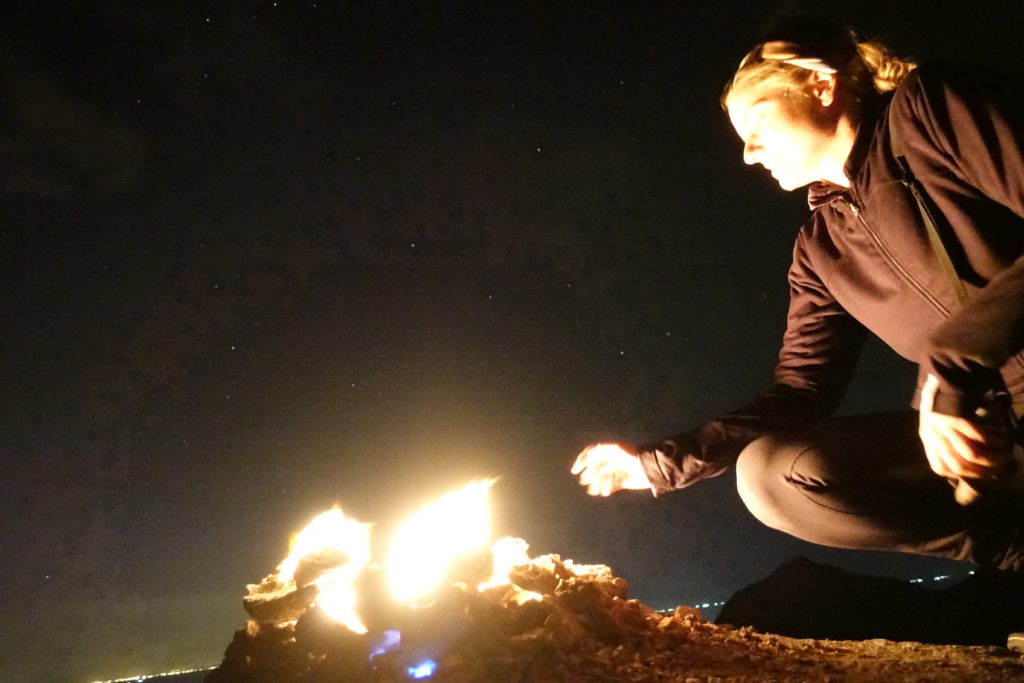
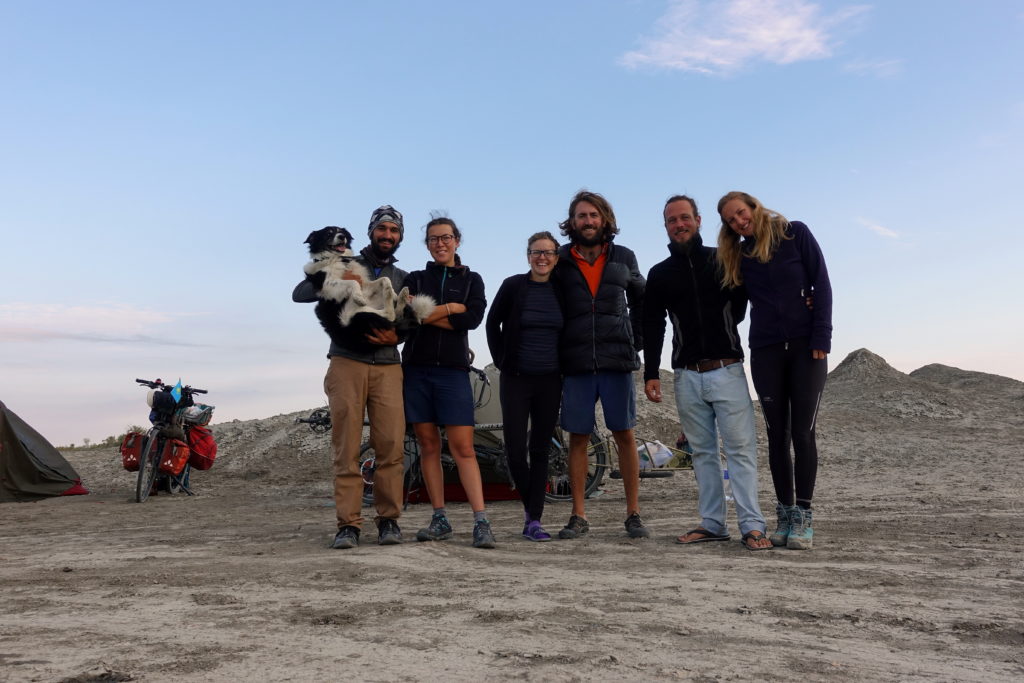
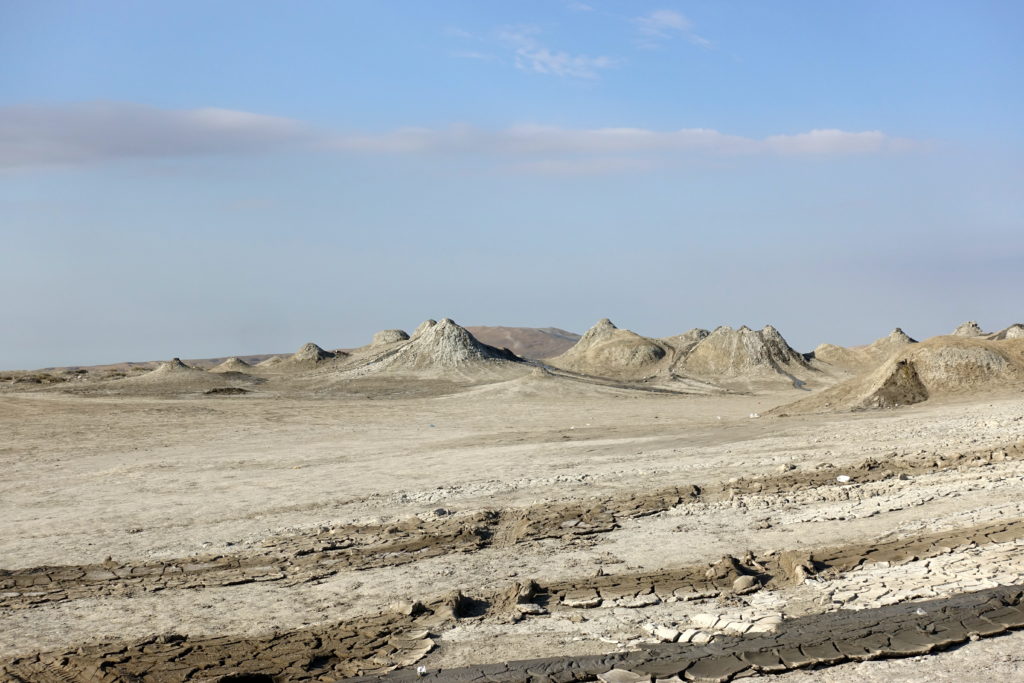
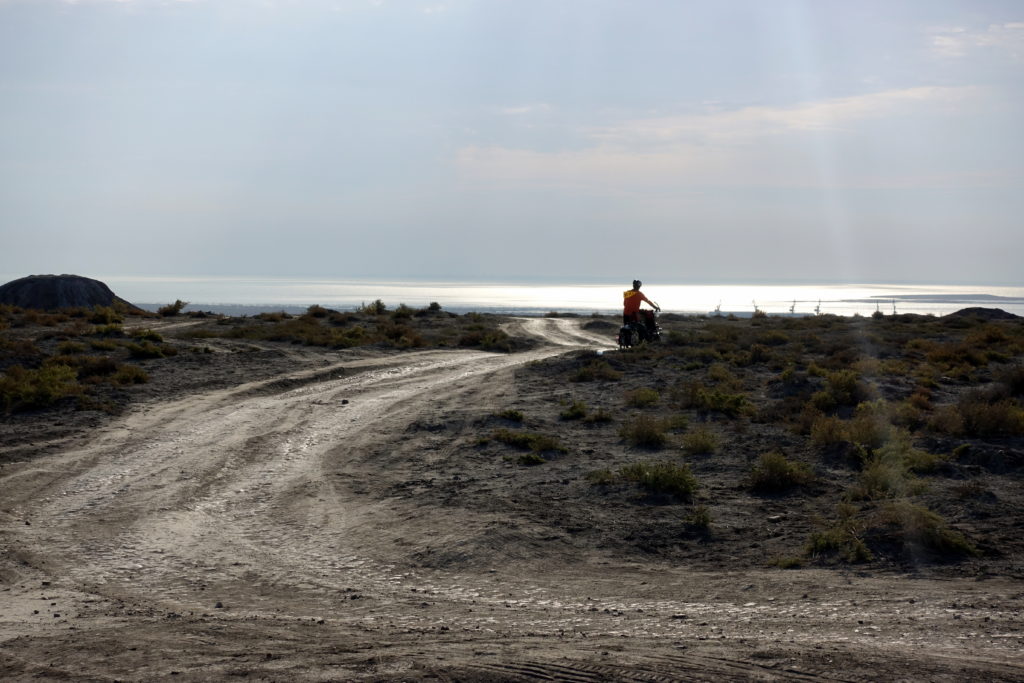
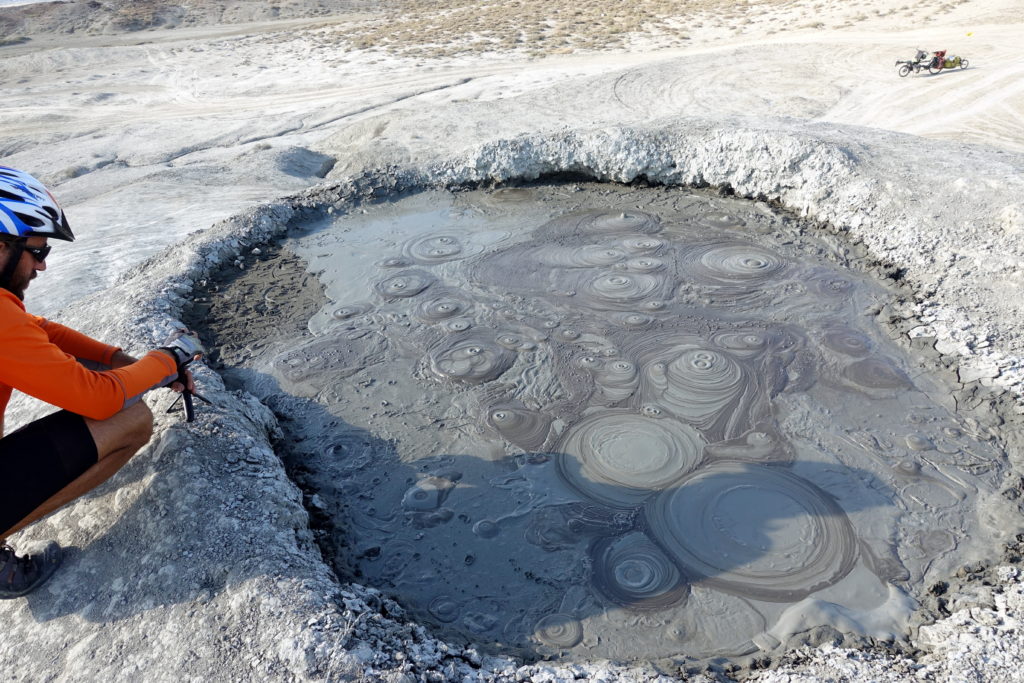
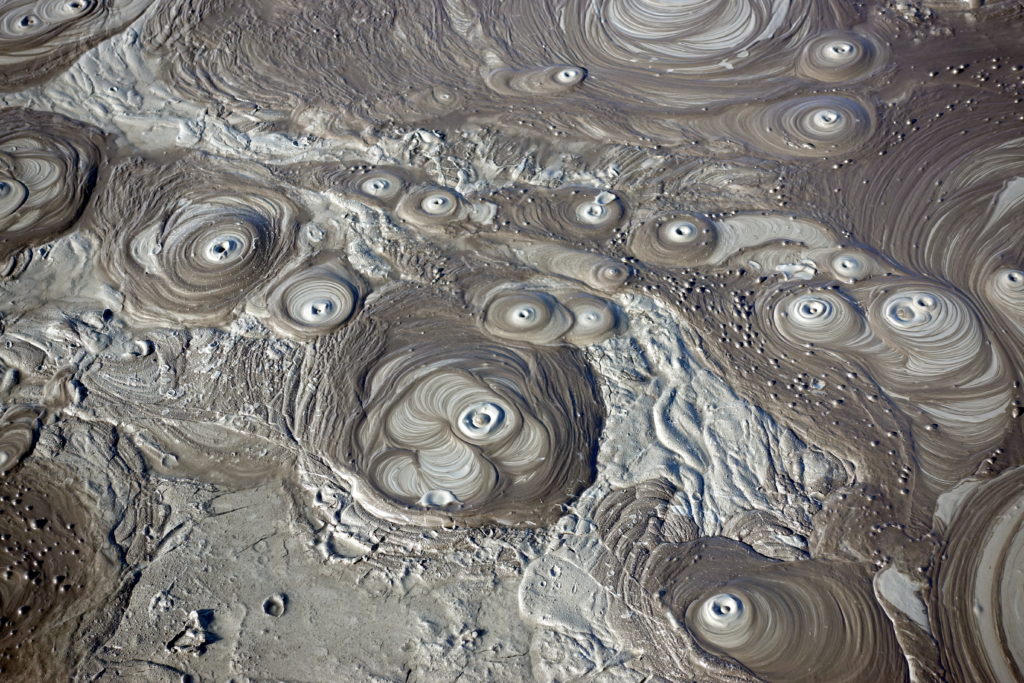
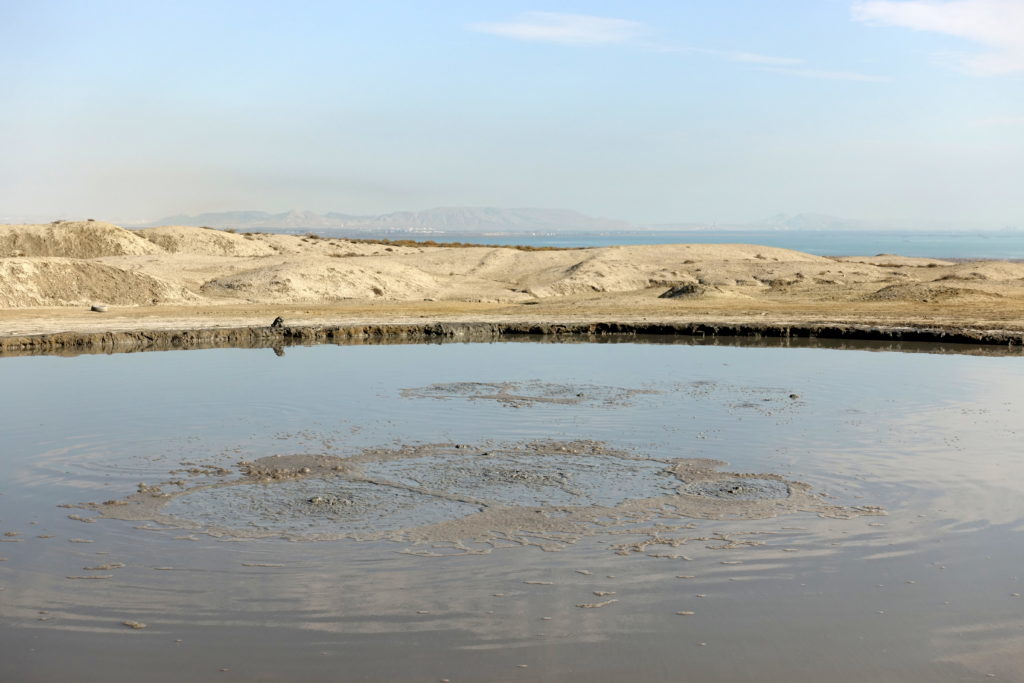
Just as we were leaving, taxis full of Chinese tourists arrived and the mud volcanoes were no longer just for us to explore. There are not too many sights in Azerbaijan, and the Gobustan volcanoes are on the tours offered from Baku. Luckily, the place is 70km south of Baku and not developed for tourism – so tourists usually pay a local driver from Baku: the earliest arrive around 9am, about our usual departure time, making the place an awesome spot for cyclists to camp!
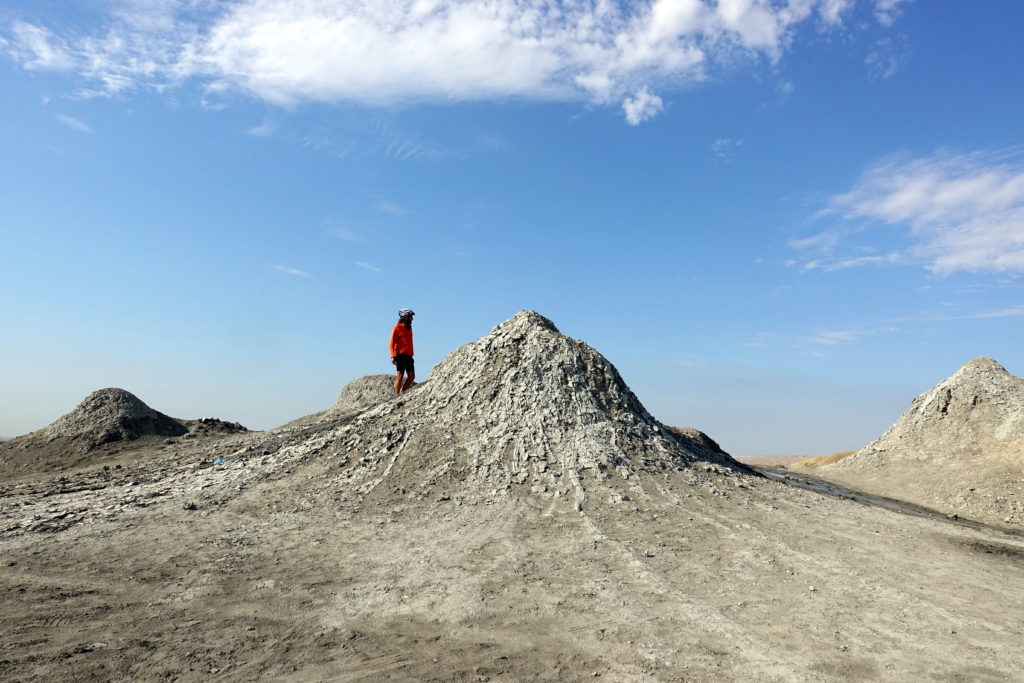
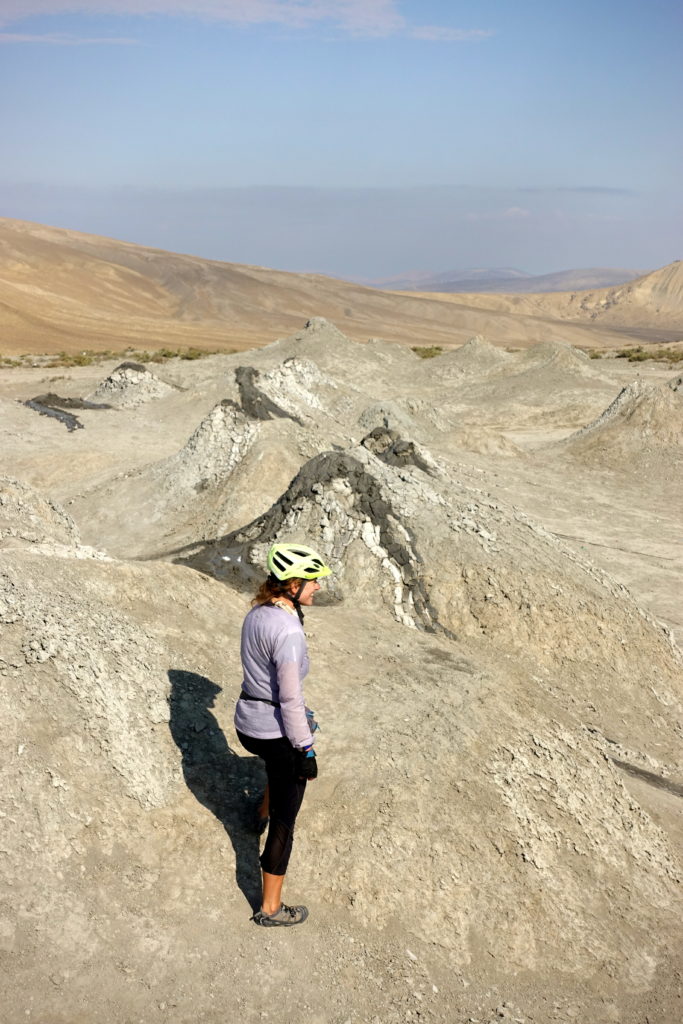
We tried to make the ride to Baku as quick as possible because most of it took place on the side of the busy highway. Luckily, there was ample shoulder for most of the journey. The ride is mostly uninteresting, between oil fields, oil refineries and pretty much all major oil industry suppliers’ plants, but essentially flat and in our case a good tailwind. As we made our way into the city, we needed to cycle with the dense traffic since bike lanes, or even ramped sidewalks, were non-existent. Looking at the price of gasoline at the gas station, it’s obvious why there are so many drivers – 50 cents per liter. Oil is king in Azerbaijan, and the country thus a little car-maniac. Making our way to the downtown hostel also became a hassle due to the densely parked cars – the Hase Pino wouldn’t fit between, and we just could not find a way to get onto the sidewalk with the quantity of cars parked chaotically. So, we had to walk around the block, looking for a gap big enough for us to get on the sidewalk. Once we were checked in and had a rest, Cédric and I went out to look for some classic Azeri food (not shashlik or kebabs, dishes with finally some vegetables!) and see some of the city.
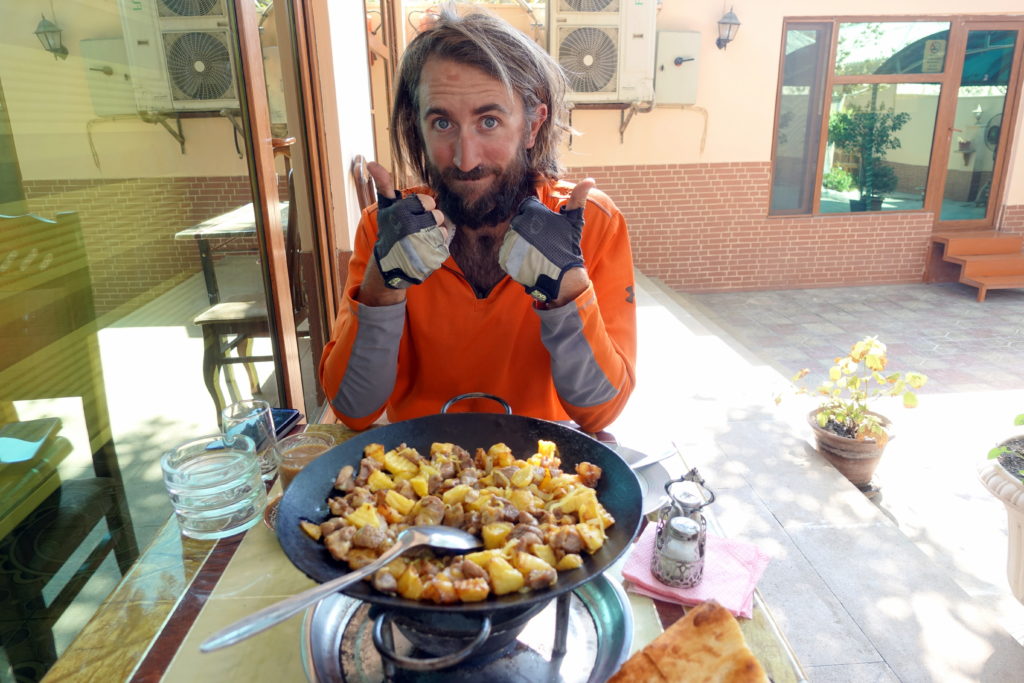
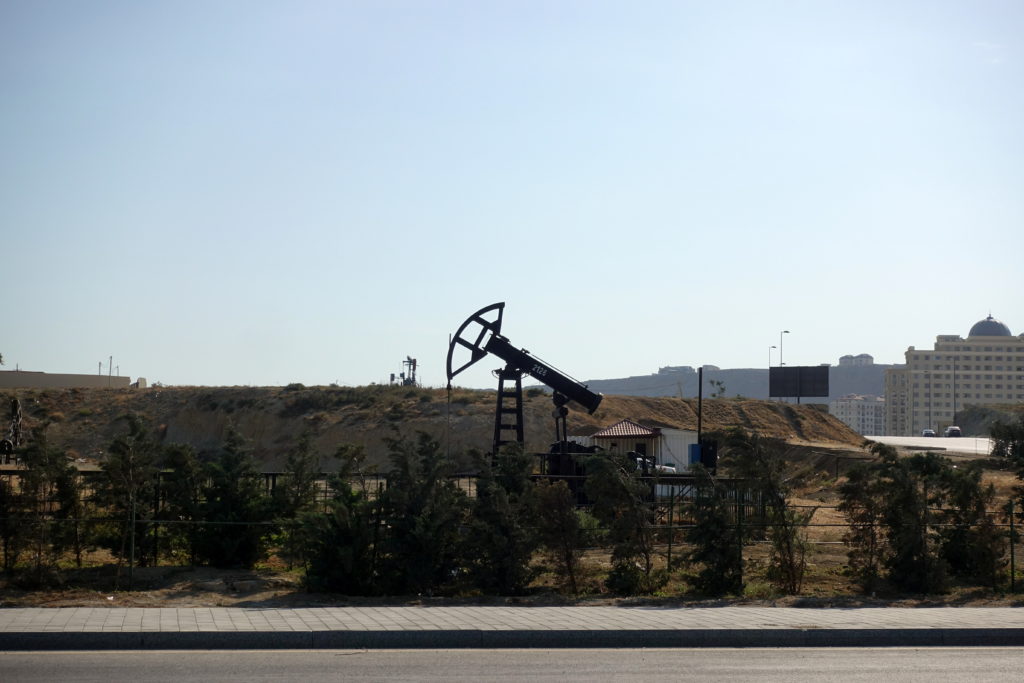
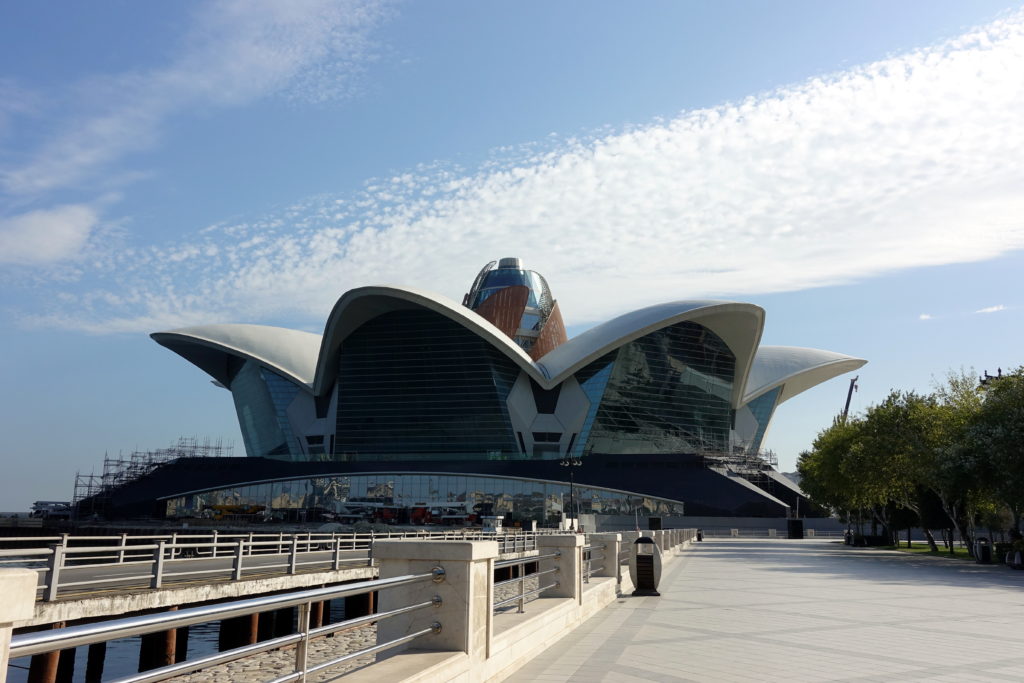
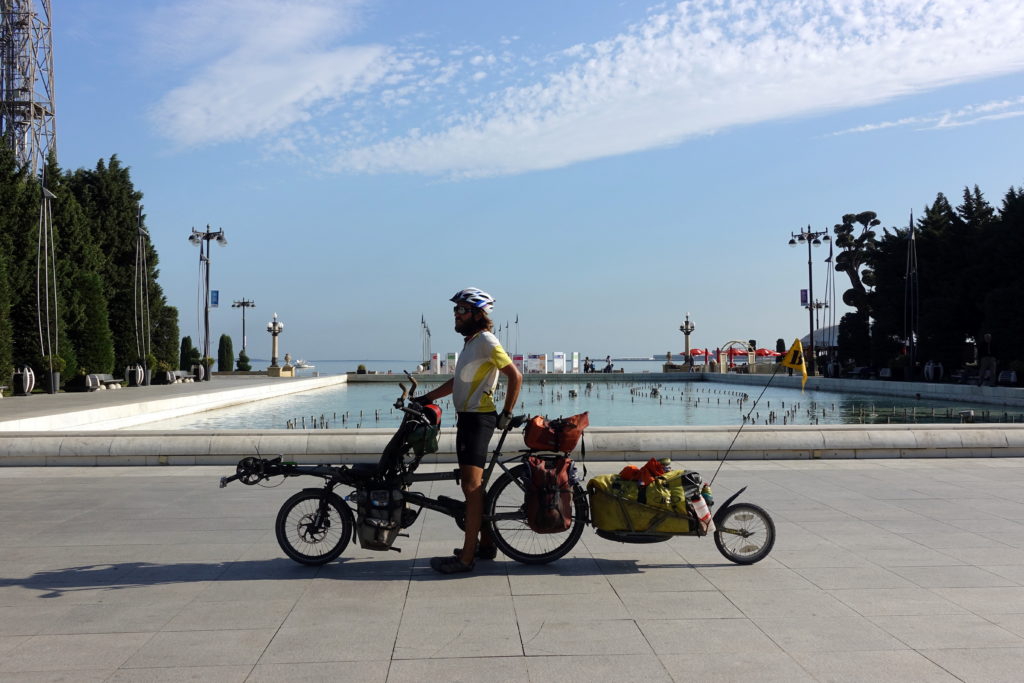
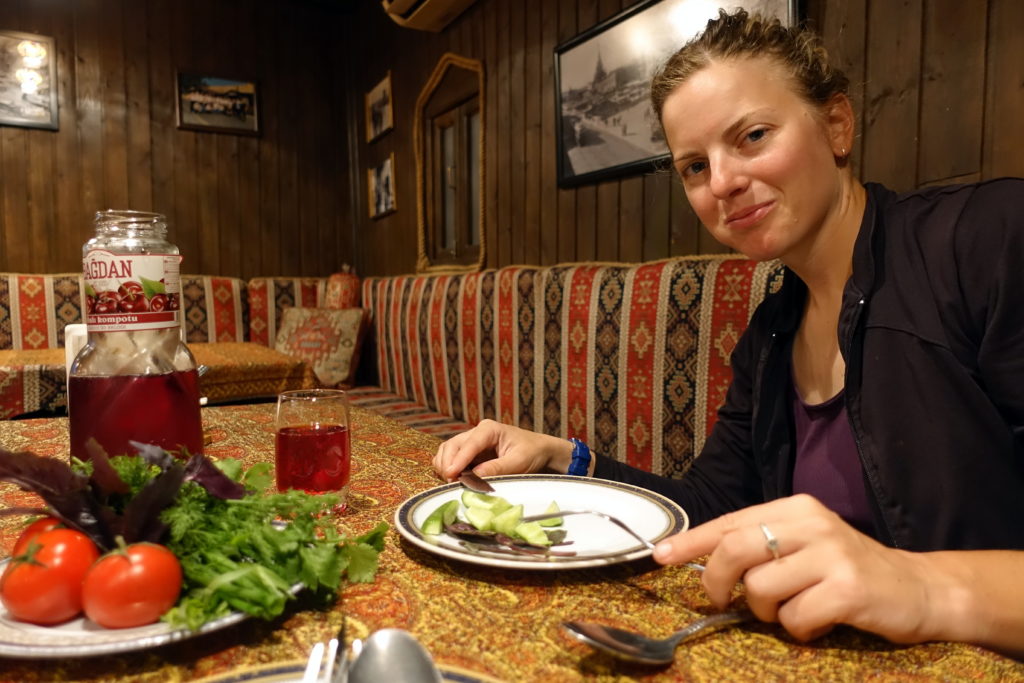
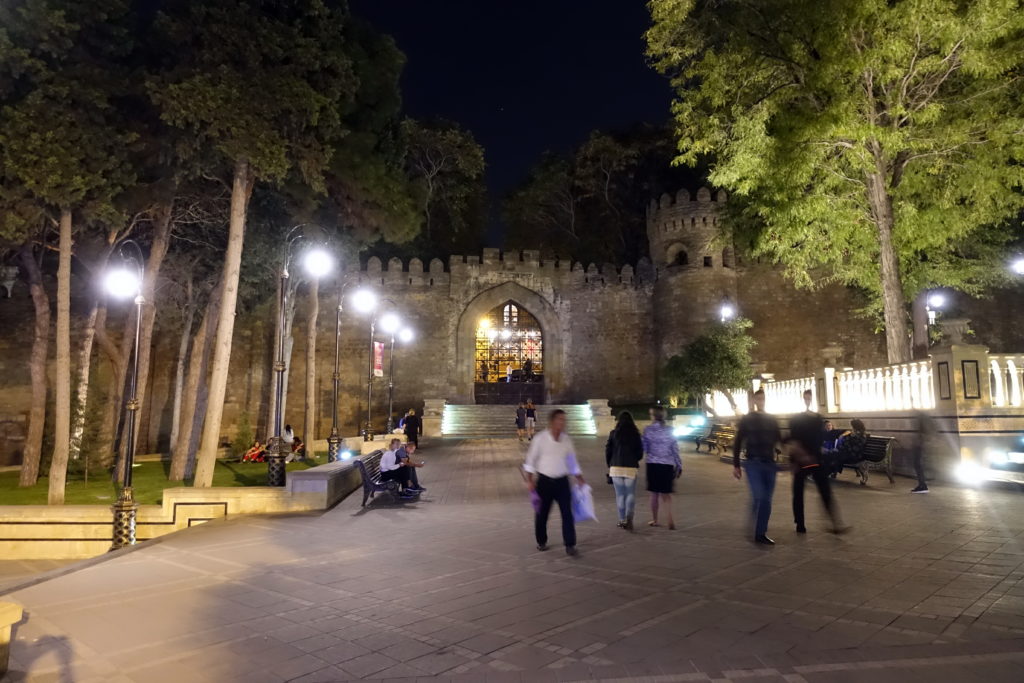
The next day, Cédric and I wandered around Baku to see some of the highlights. We walked around the Flame Towers, three iconic buildings of the city, through gardens, and in the old city. Along the way, I found a post office, so I could send my absentee ballot for the upcoming elections (Americans, don’t forget to vote!). We also visited the modest Shirvanshah Palace (a dwarf compared to the palaces in Bukhara and Khiva) and saw the Maiden Tower. In the afternoon, we restocked our food stores for the bike and found a few bakeries selling all types of baklava.
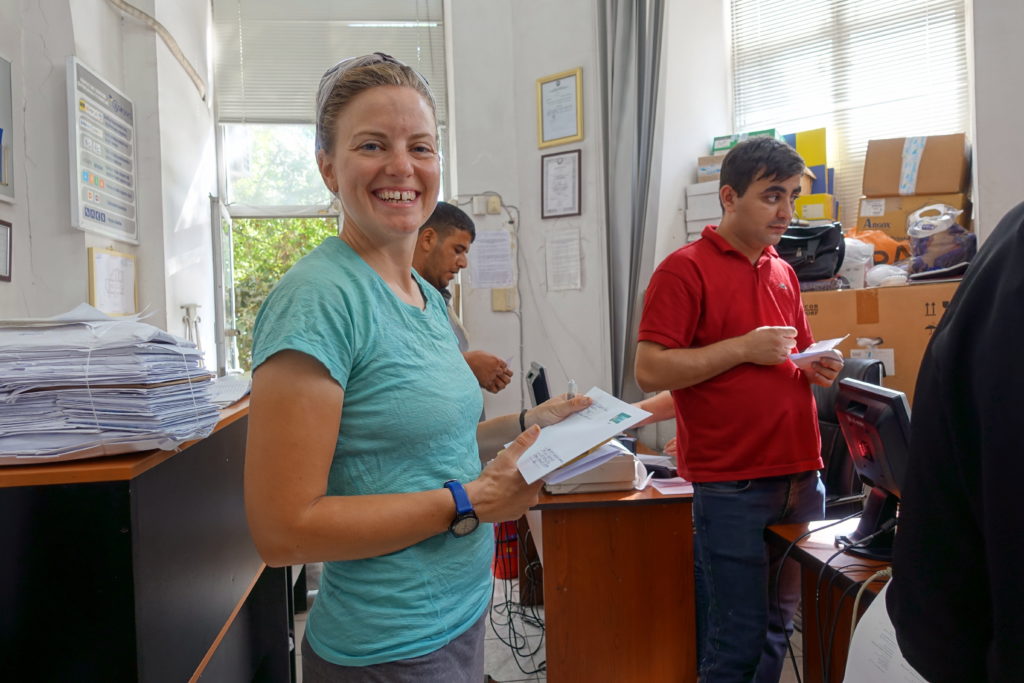
(Cedric made sure she voted for the correct candidates)
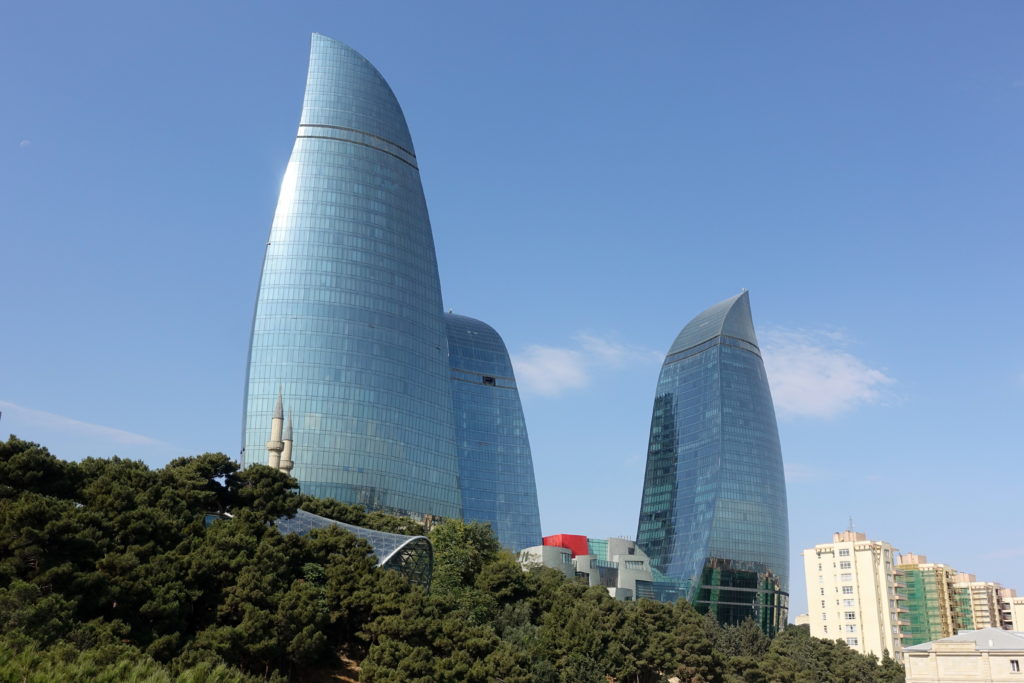
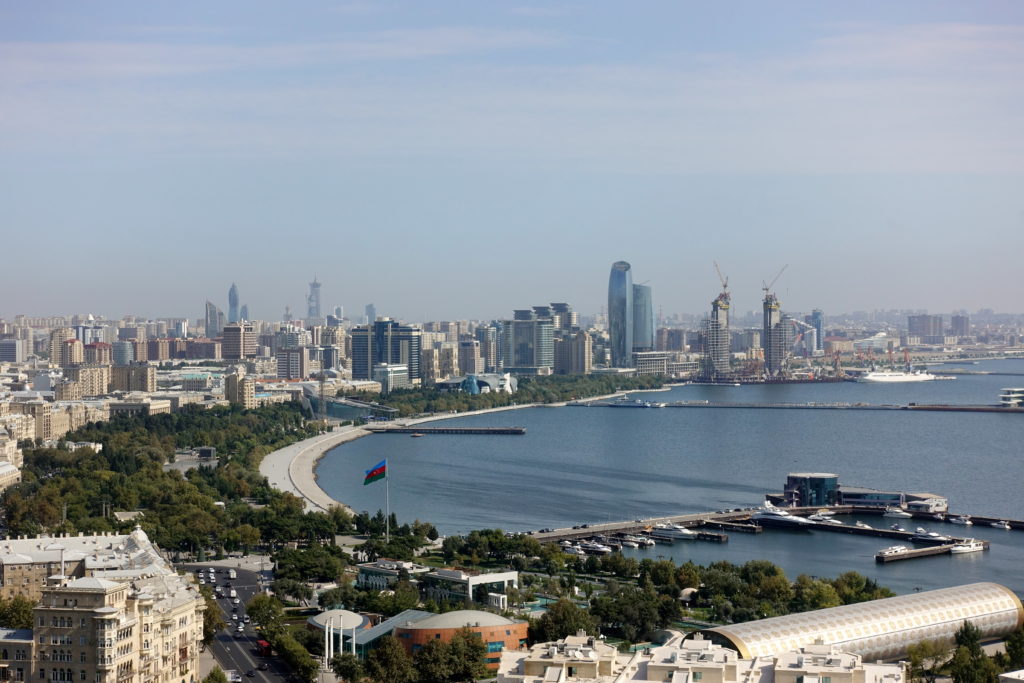
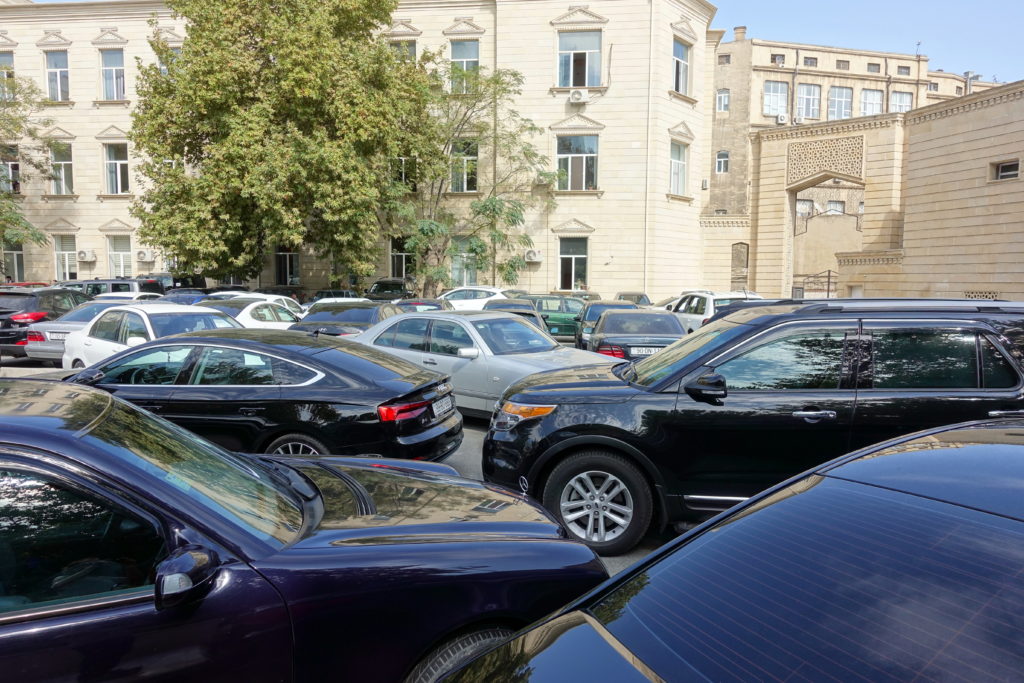
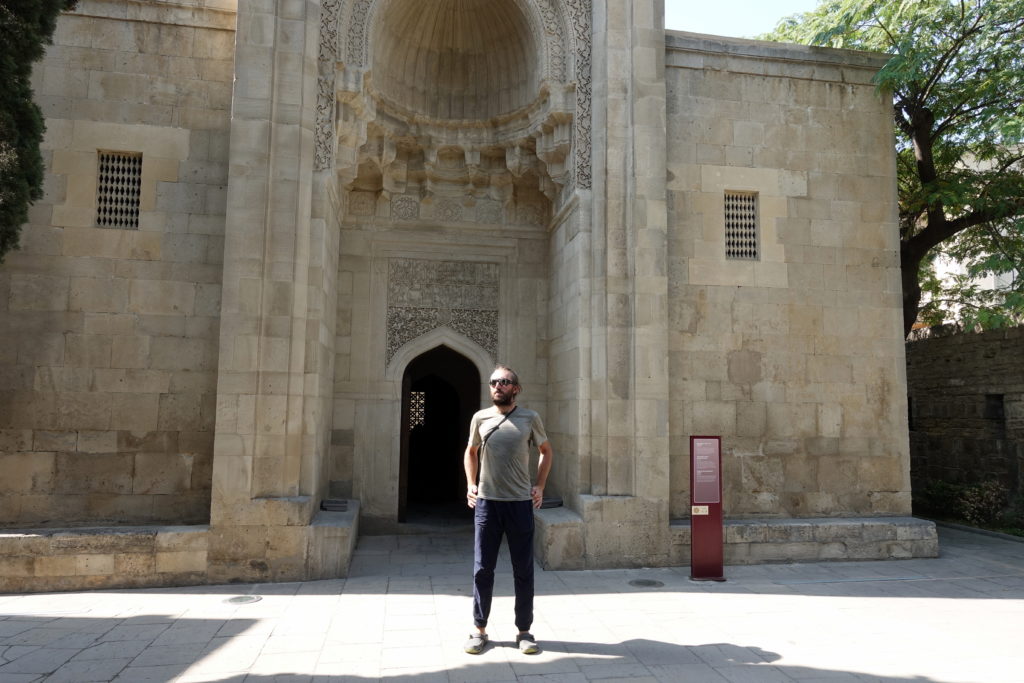
Baku is famous for its petroleum industry but was pretty much nonexistent and insignificant until the 20th century (although as usual, the history museum makes you believe that Azerbaijan controlled half of the world at some point – but we’ve heard that same story in every single country since Thailand!), so the historic downtown just feels like a well-preserved European fortified medieval village. The Soviets did not allow such a concentration of wealth (and the related lavish constructions), so nothing particularly interesting until the 1990s. Azerbaijan has since then been presided by a family (father and son) who apparently love fancy constructions in the capital with some European capital inspiration (ahem, Paris). The center of Baku is thus surprisingly clean, shining and modern. It’s a different story 500m away from the shore, or 5km further.
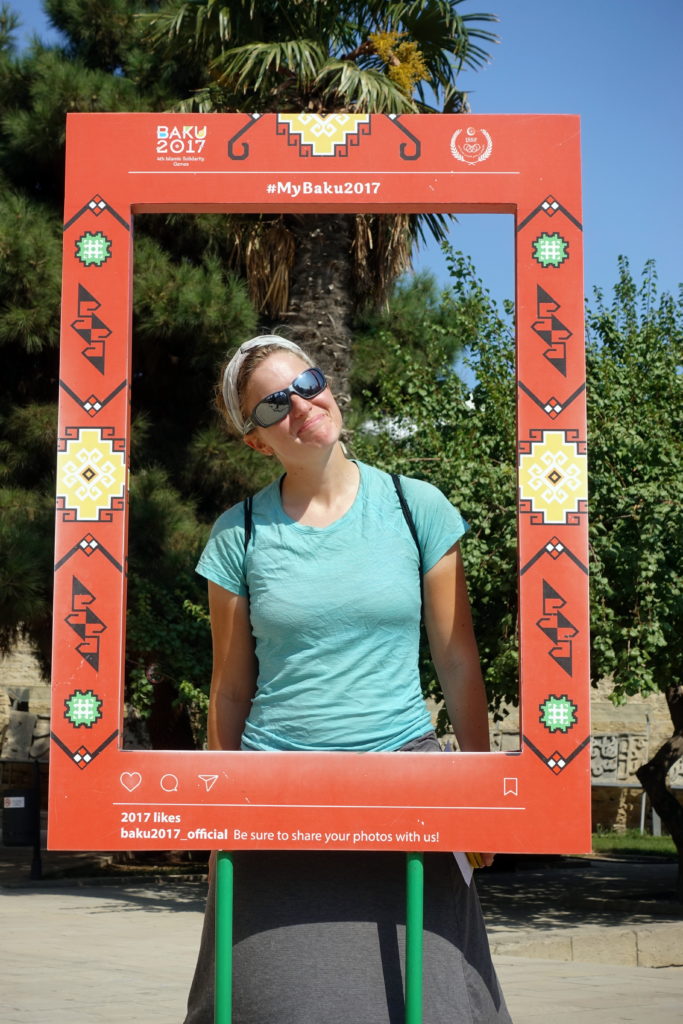
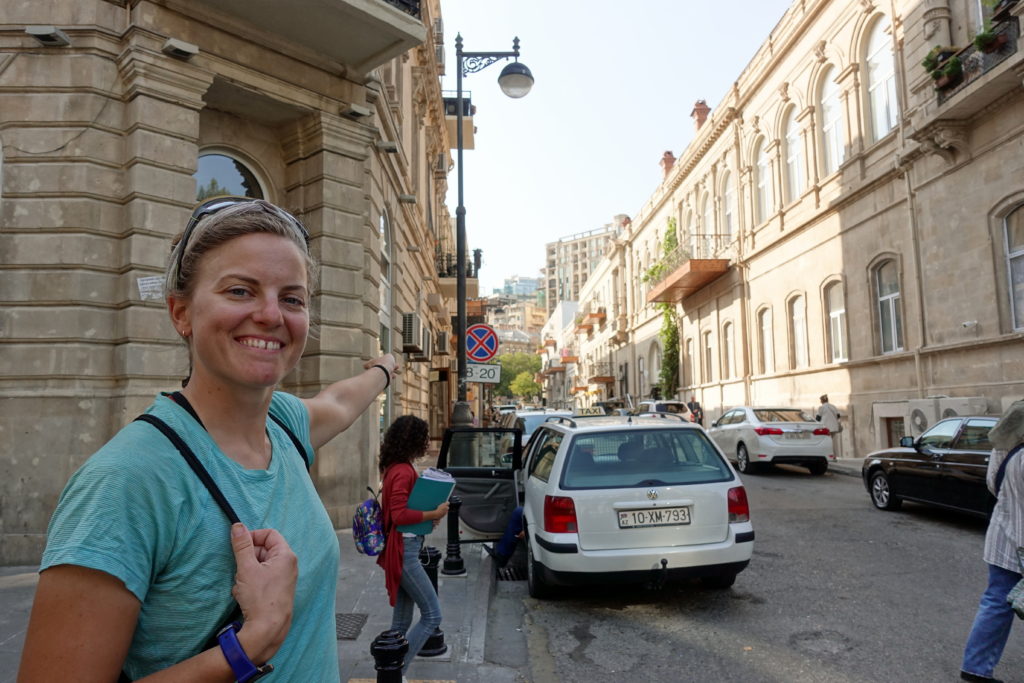
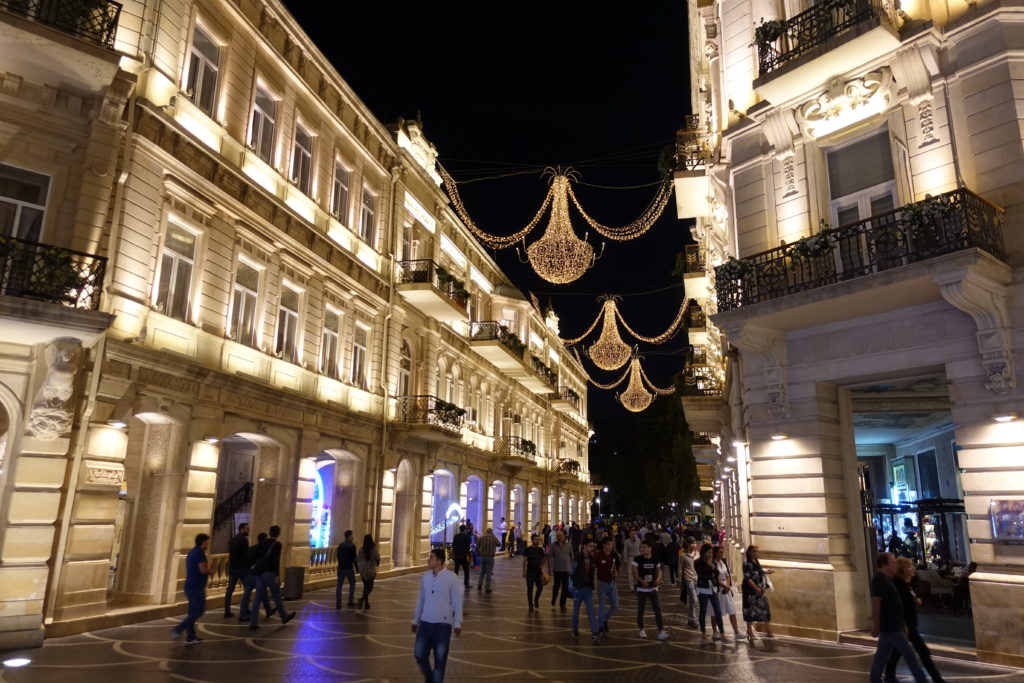
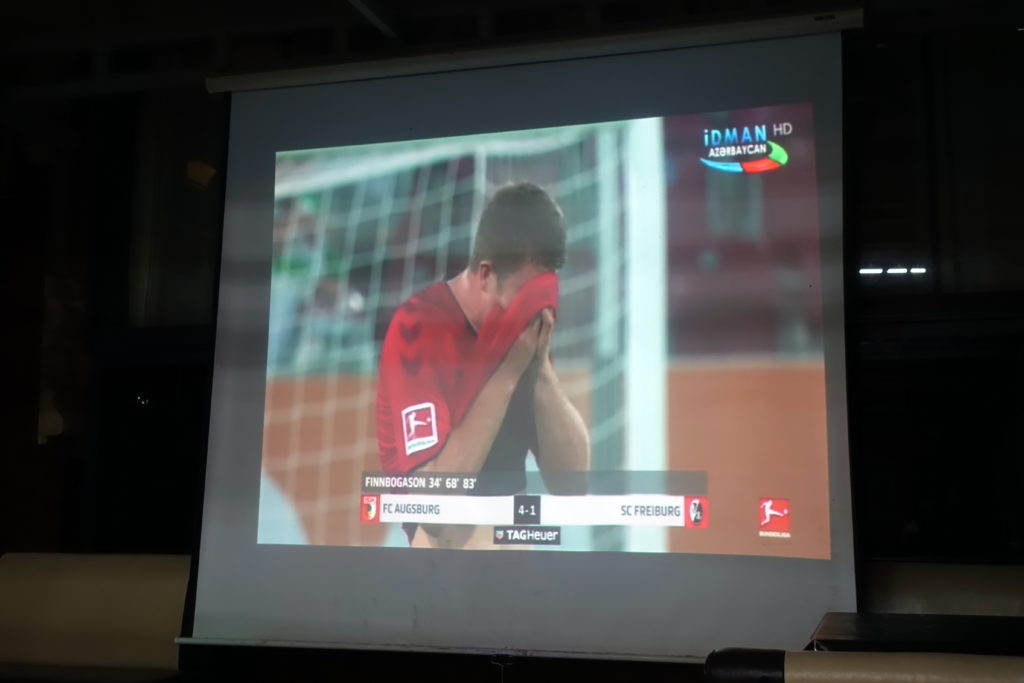
After another night in the city, we left Baku and headed for the mountains. Trying to cycle out was difficult – the traffic was immense, but the cars were moving at a sluggish pace and spewing out noxious gray emissions. After about two hours of navigating the roads, we were finally moving at full speed on a stretch of perfectly asphalted highway (another benefit when a country is loaded with oil). The police seem to be everywhere on major axis, particularly in and out of Baku, with also a lot of traffic and speed cameras on the way, so drivers are respecting rules (enough, especially after Central Asia) and we felt relatively safe (still not German bike lanes!).
Just like our ride into Baku, the landscape was rolling amber hills and void of any tree. Although we had crossed thousands of kilometers in the last week, the small towns and villages felt very much the same compared to Central Asia, but after the opulence of Baku, the poverty seemed comparatively more shocking. In every village, we could still expect a nondescript market (the only indication that it’s a market are the faded images of some brand on the outside), Ladas slowly driving down unpaved streets, and dogs, kids, and locals milling about. The only remarkable difference on the road were the pristine, newly built gas stations. In the afternoon, we met two German cyclists who were headed in the opposite direction. They mentioned that there weren’t so many shops or water sources for the next few kilometers, which made us re-think our camping plans. A few kilometers later, we passed by a café and decided to ask whether we could camp behind the building in exchange for us getting dinner there. The plan worked, and we enjoyed an evening looking out over the Azeri hills.
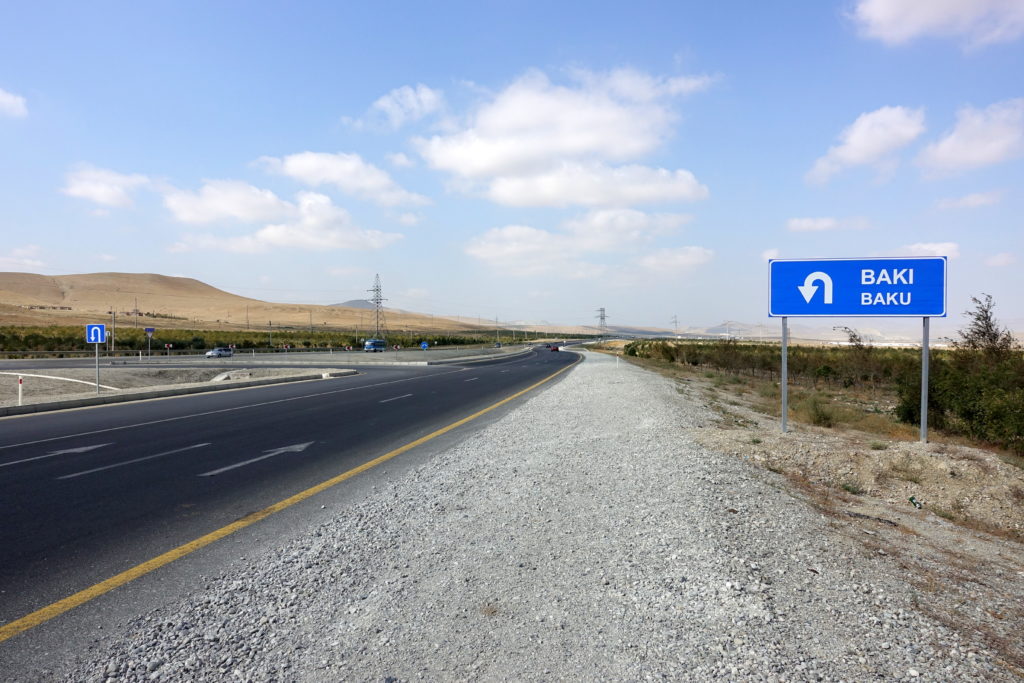
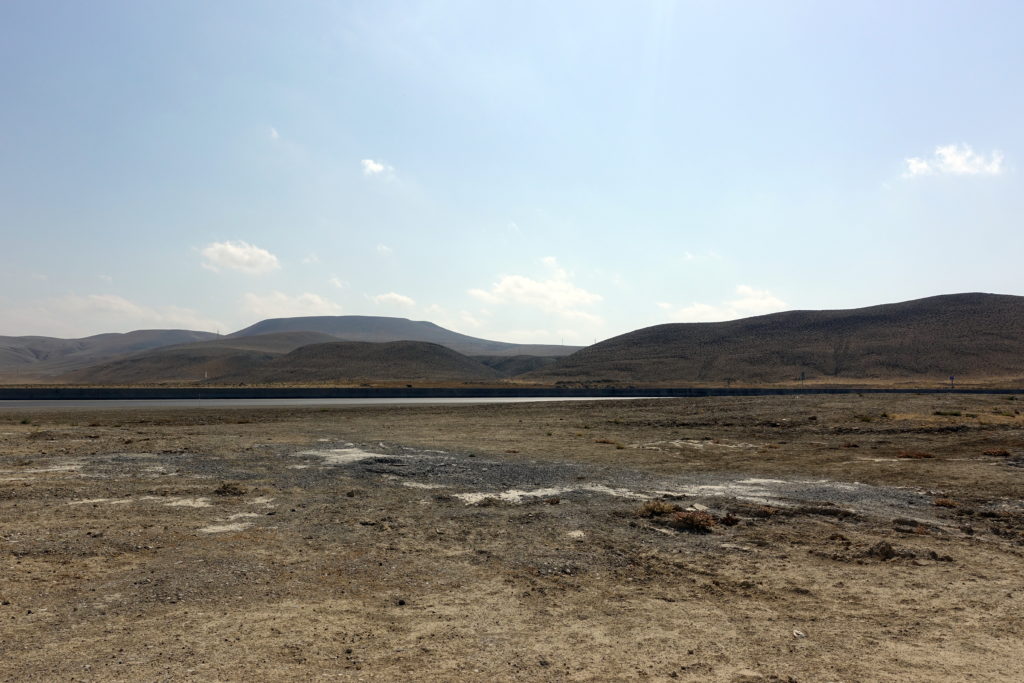
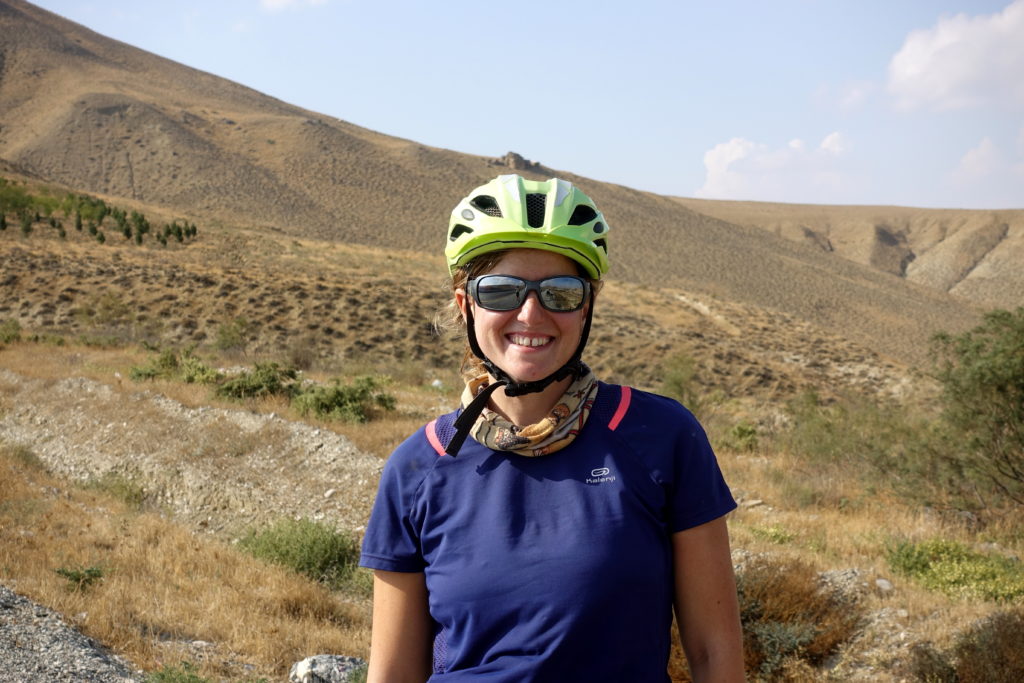
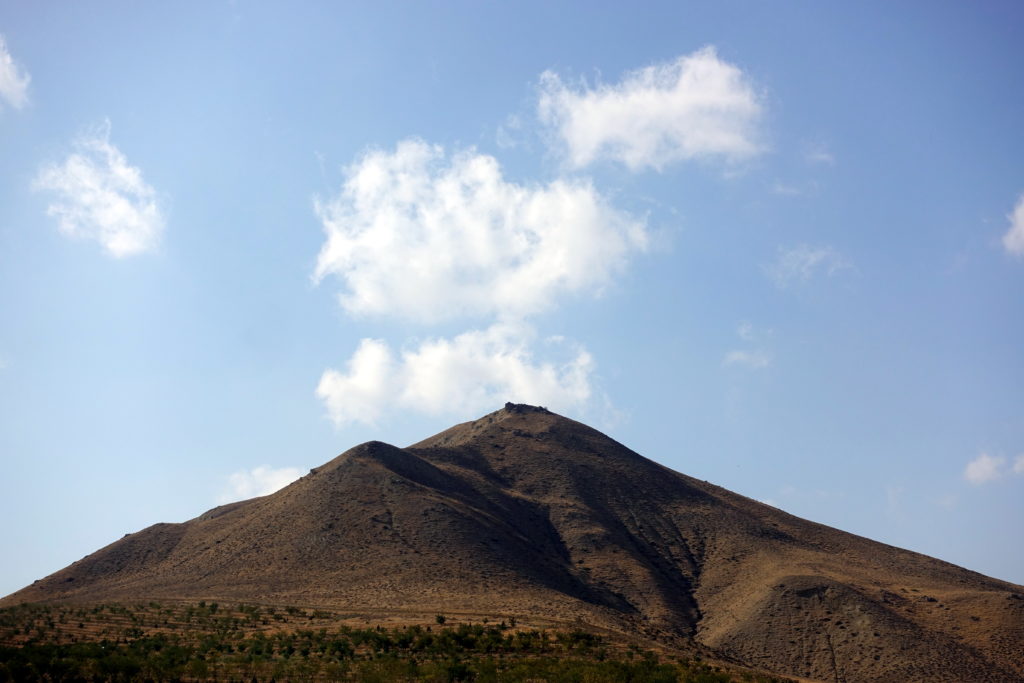
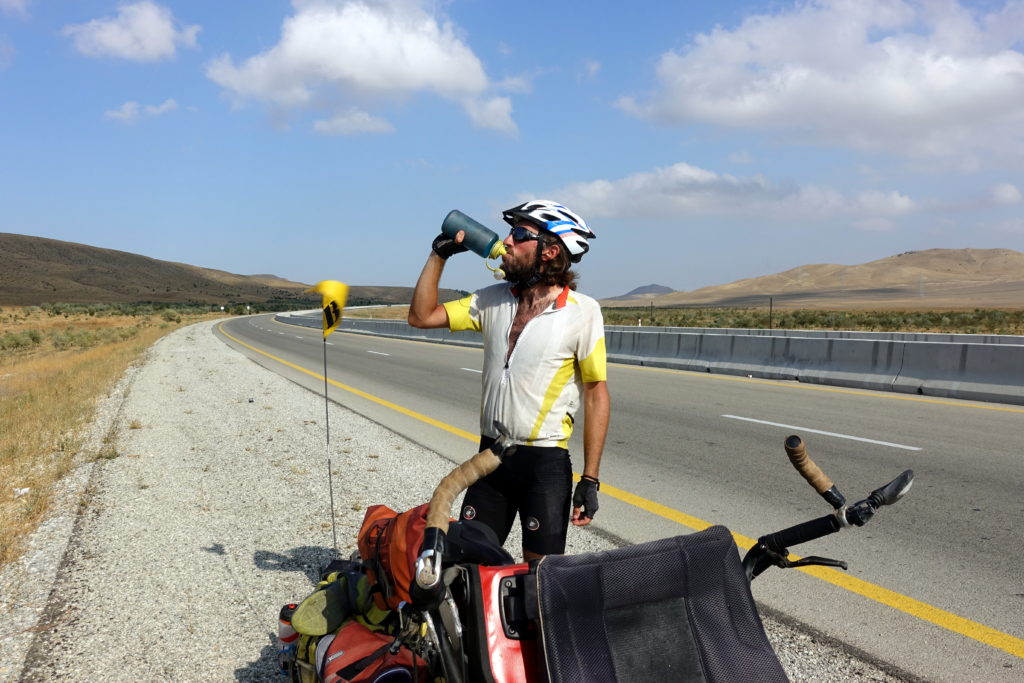
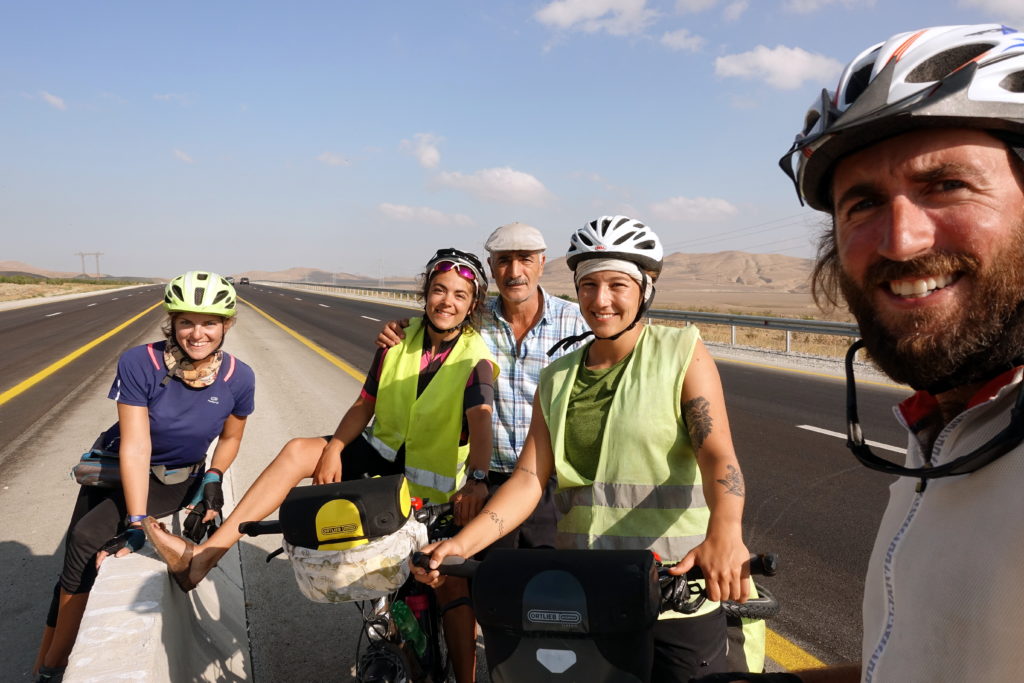
Also about the old dude… well, this is typical Azeri men: he saw four people so decided to invite himself, we showed very little interest stopping our conversation in German for him, could not converse with him in any common language, but he decided to stick and just be there. When we decided to take a picture together he somehow figured that it would be for us to remember him…
Yes, men are seriously annoying in Azerbaijan! The two German cyclists were even more exasperated by them (also note the hand on the shoulder, etc…).
The next morning, Cédric and I continued along the road, beginning with a long climb. I had hoped that new countries meant new landscapes (namely lack of mountains), but apparently hills were inevitable on our way, so I became unmotivated for a second. However, we did notice something that we hadn’t seen in abundance while in Central Asia – trees. Gradually along the road, they started to become interspersed with the bushes until we noticed forests. We rolled through Shamakhi in the afternoon, an odd town filled with kids smiling and asking for money the moment they saw us – those kids clearly did not look like the poorest of the area, and had a particular English vocabulary set: either “hello”, “money” or “f**k you” (to be honest we are not certain that they knew the real meaning of the later), so we just rode through and completely ignored the town. Suddenly after the city, the hills burst into life. The moment we got out of the city limits, we found vineyards and forested hills and leaves changing color. It was weird to be hit with a new climate so quickly, literally within a few kilometers from a steppe to a dense forest. This also meant new crops and types of food sellers on the side of the street. Here, it was aggressive walnut hawkers, who would step out on the road in front of the bike, attempting to make us stop. They obviously could not do that to cars, so had all hopes of selling their products to us, not understanding that there were similar sellers every 100m for the last 20km, and as we would not stop started to get angry at us. All those sellers were men, so we decided to boycott them, and stop only at the rare (but friendlier) ladies. In the evening, we found a nice camping spot nestled in one the hills and chatted with a shepherd passing with his flock – he seemed very intrigued by our tent and how we set it up, so we became his entertainment of the day.
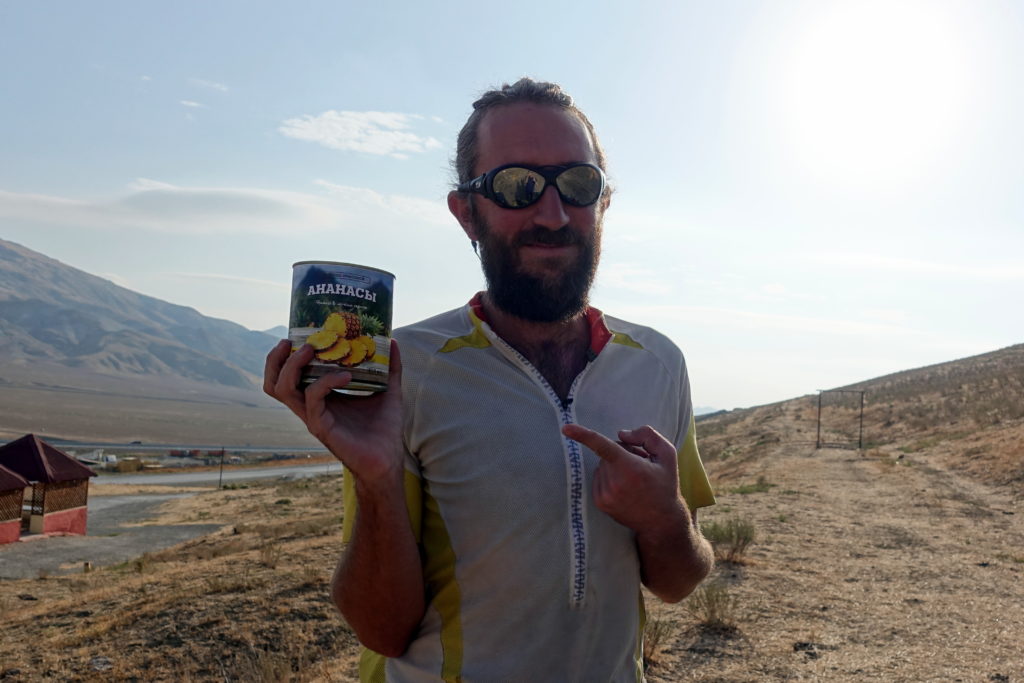
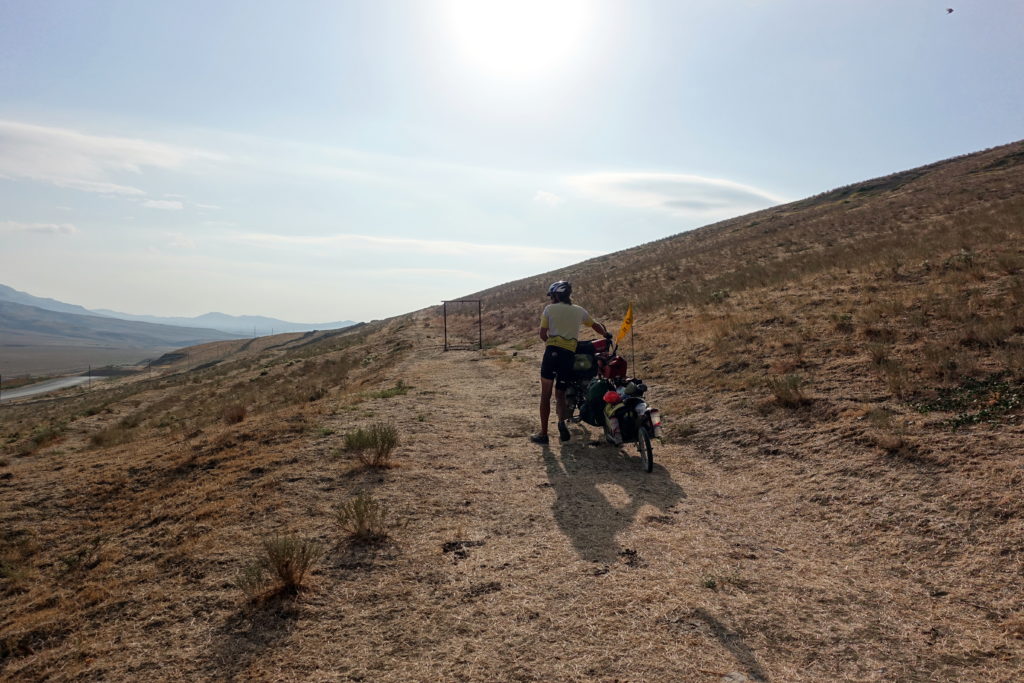
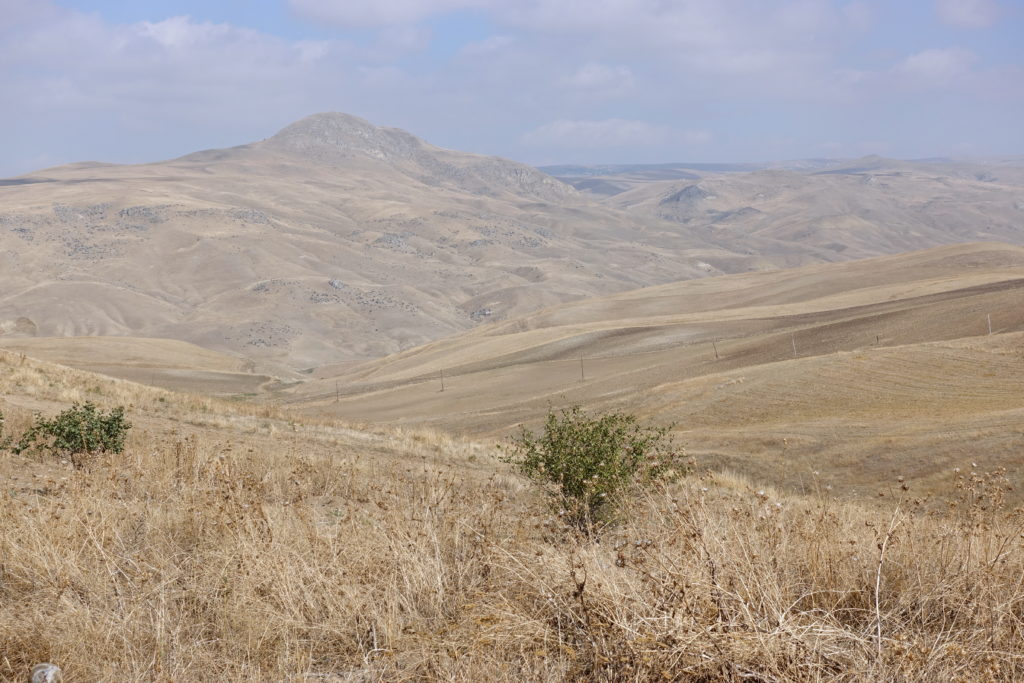
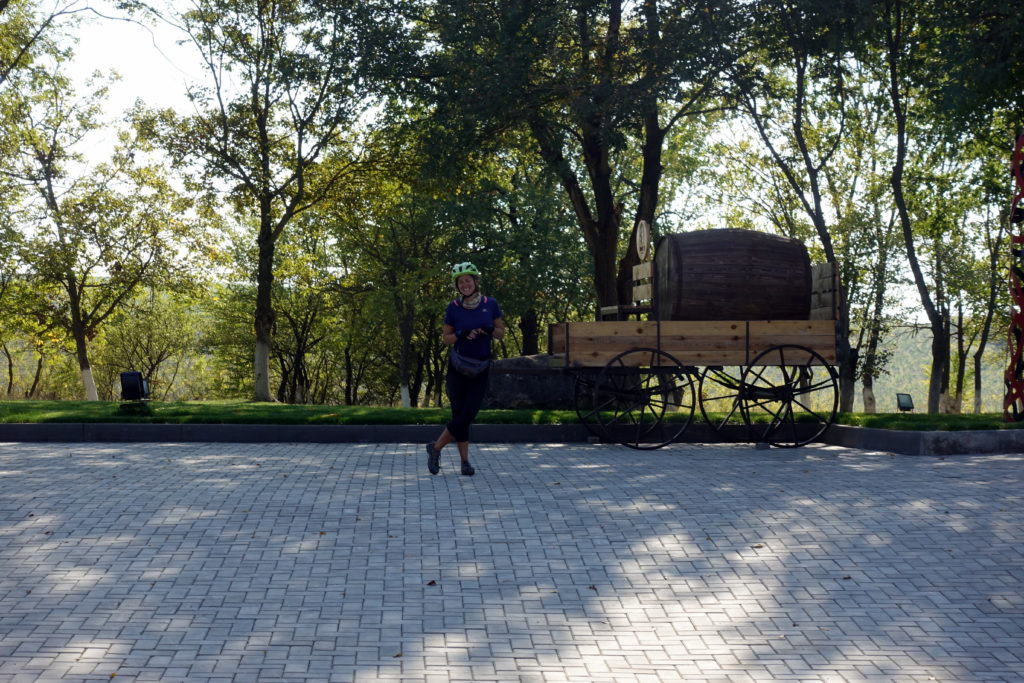
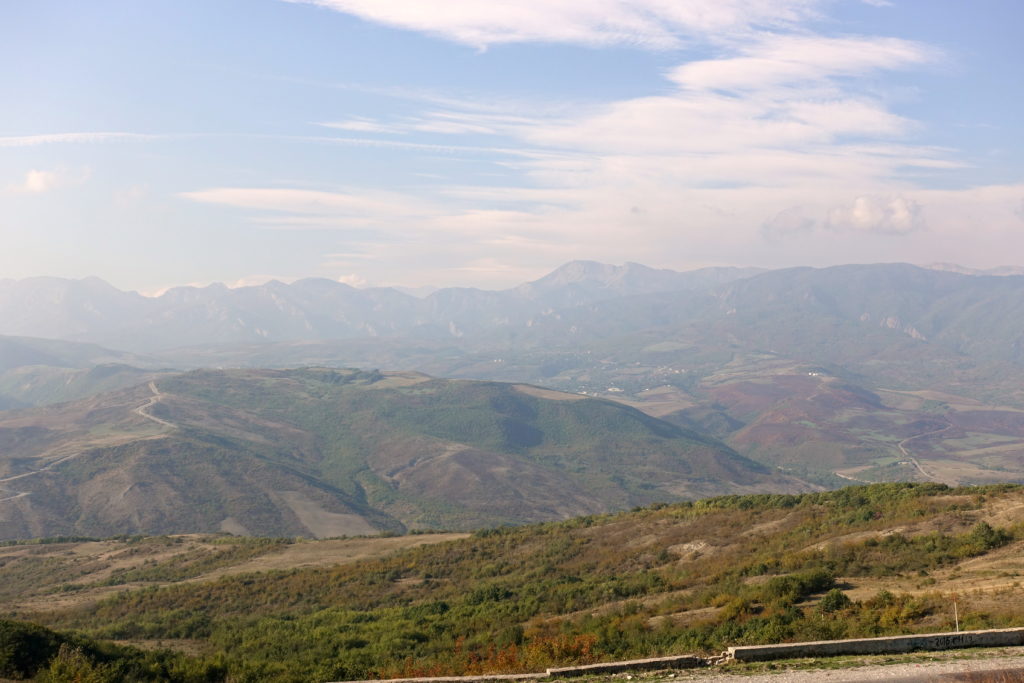
When we woke up the next morning, dark clouds were swelling around the mountain tops, so we quickly packed before the rain started. For me, it was one of those rare nights where I needed to zip up my sleeping bag completely because the night was cool. Autumn had arrived and unlike the other instances on our trip (New Zealand and Australia), we wouldn’t be able to fly to a new place to escape the cooling temperatures. A light rain followed us the entire morning as we cycled over some large hills and up into the clouds. On the side of the road, vendors were selling tea and colorful circles of fruit leather- this area was supposed to be very touristic in the summer and on weekends, but no one was stopping in this miserable weather. We made a break in Ismailli for a warm lunch (which unsurprisingly turned out to be shashlik) and noticed another unique feature of Azerbaijan – the absolute lack of women in public spaces, accompanied by the overabundance of loitering men. Whenever we stopped, our bike would quickly draw a crowd of men, who seemed to appear from every corner of every nearby house. No one would talk to us, but just stand very close and look and poke at the mechanisms. In Ismailli, it was particularly bad. The main street was already teeming with men hanging around, but when we stopped, we quickly gathered a crowd of 20, some of whom didn’t understand the concept of personal space. With no one venturing to say hello or even acknowledge our presence/ask where we’re going, we decided to cycle off and find the town’s most secluded restaurant for lunch. We had gone through more or less misogynist countries in Central Asia, but there were always men and women in public places and in various businesses. In Azerbaijan, there are just no women, nowhere (with the notable exception of the more liberal city of Baku) and most of the men are idle, thus bored, and whenever something new happens in town they immediately show-up. But the difference with previous countries, nobody cares about you, they just kick your wheel with the foot when they talk to each other about your wheel, start playing with the GPS believing that it’s a mobile phone they could use, etc. Cedric started to get a little more aggressive and raising his voice as we went, and (gently) bodily with teenagers. You give a kick into the spokes, you get immediately mightily pushed a meter away – and they seem really surprised. We get that our bicycle is interesting but use your mouth and not your hands/feet and after weeks in ex-Soviet countries, we can manage simple discussions in Russian. We have not much to lose from those uninteresting encounters, and it helps that Cedric is a head taller than the average adult – so gigantic for those teens. Azerbaijan is yet an enjoyable country to ride through, but men there have a serious behavioral issue…
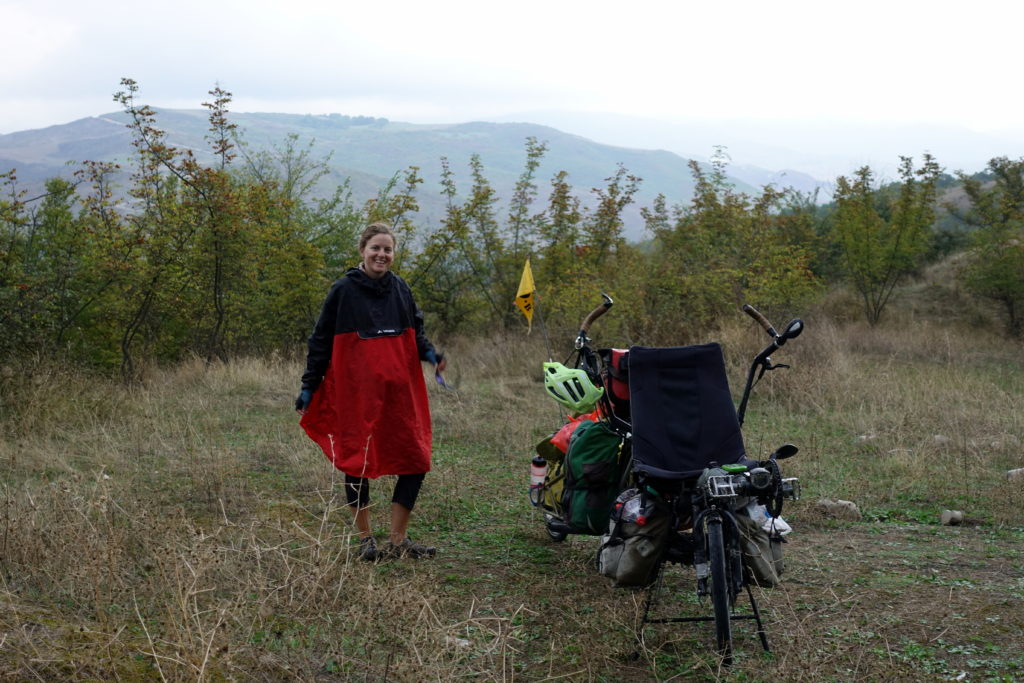
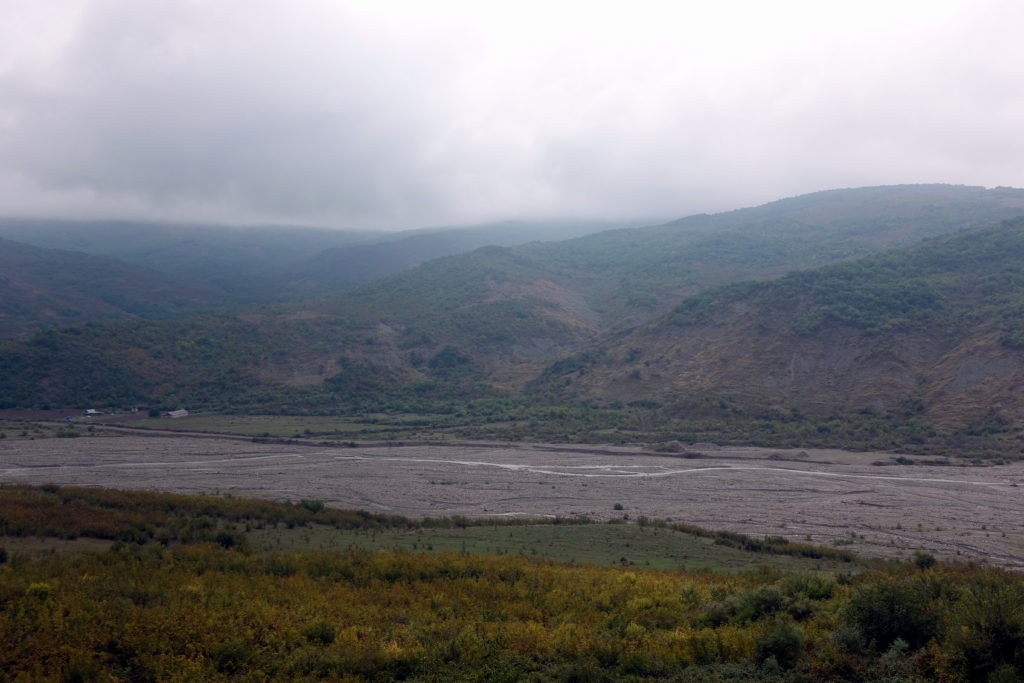
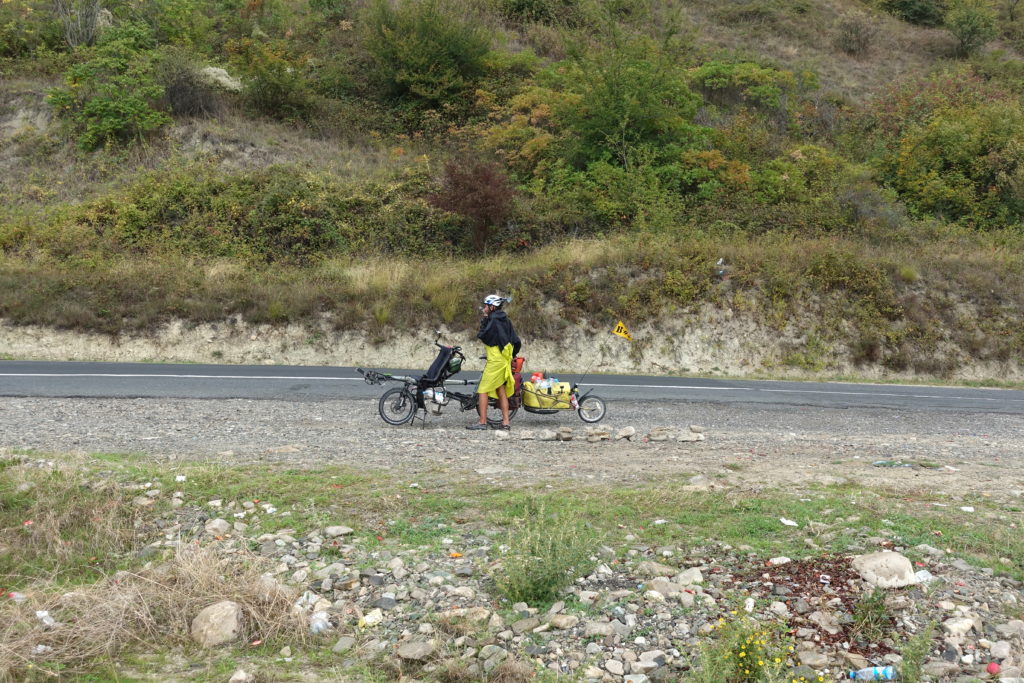
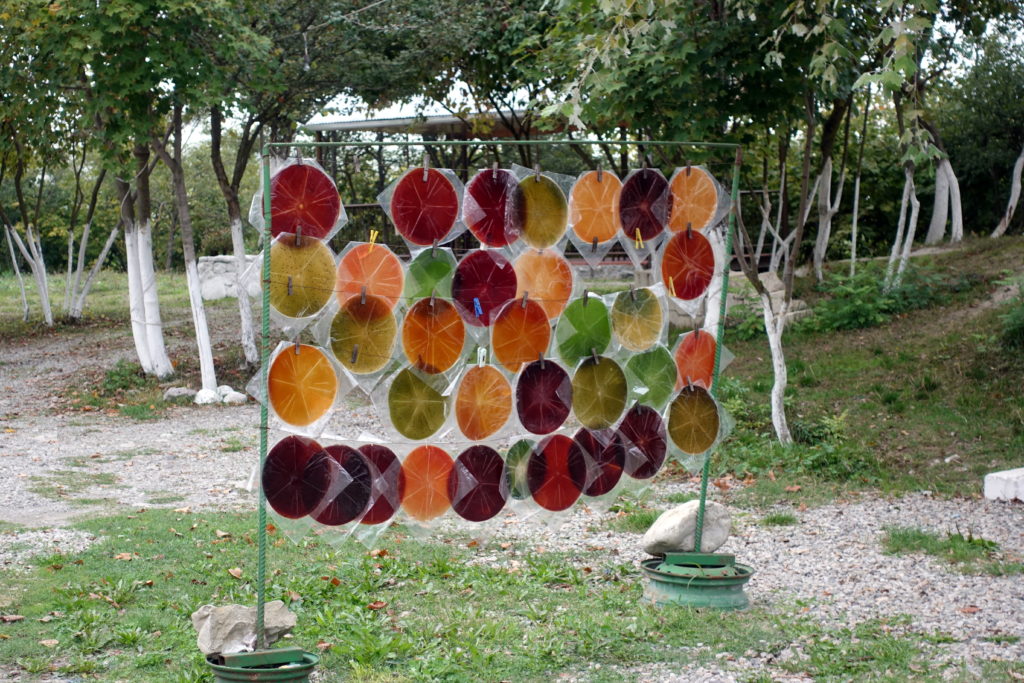
In the afternoon, warm from tea and barbecue chicken, we followed the road west and through more forests on the mountain sides. Because rain was still in the forecast for the evening, we spent the evening occupying one of the many bungalows at an empty resort.
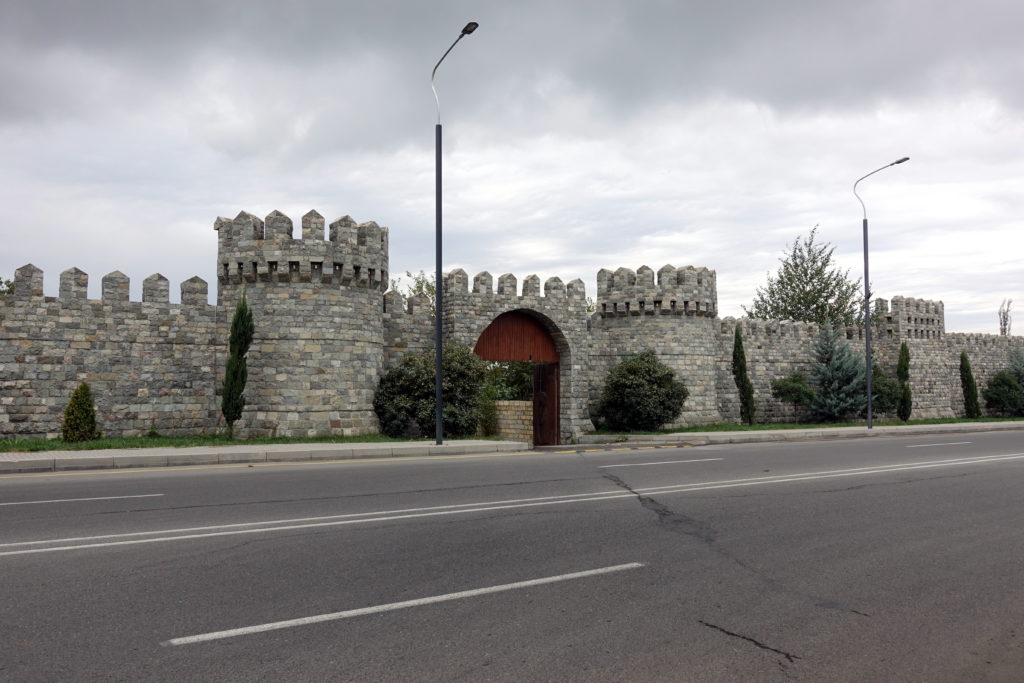
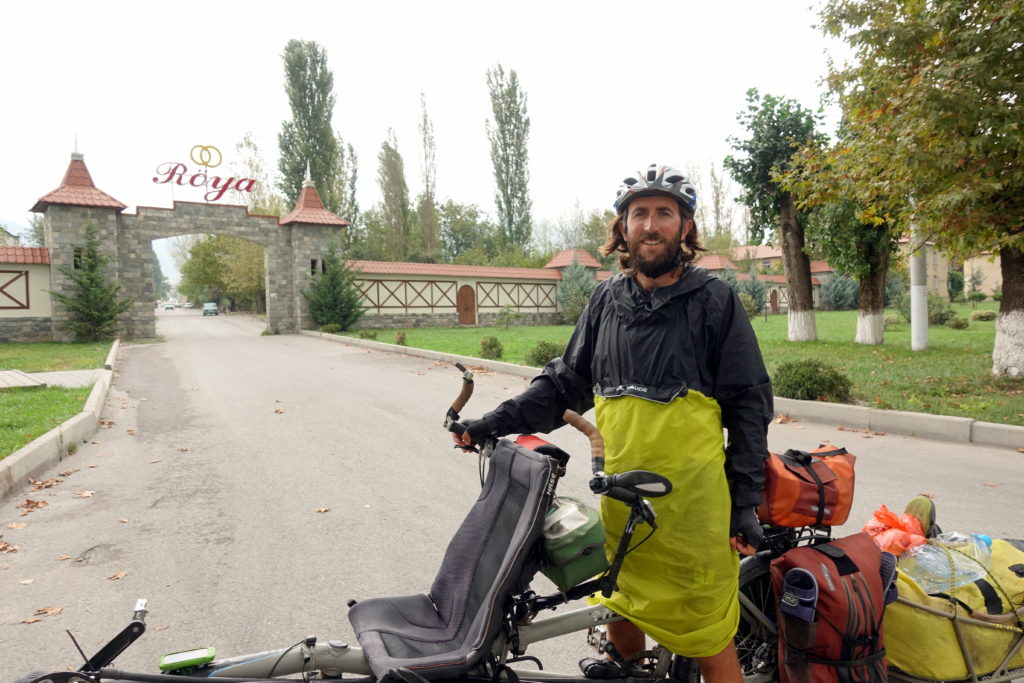
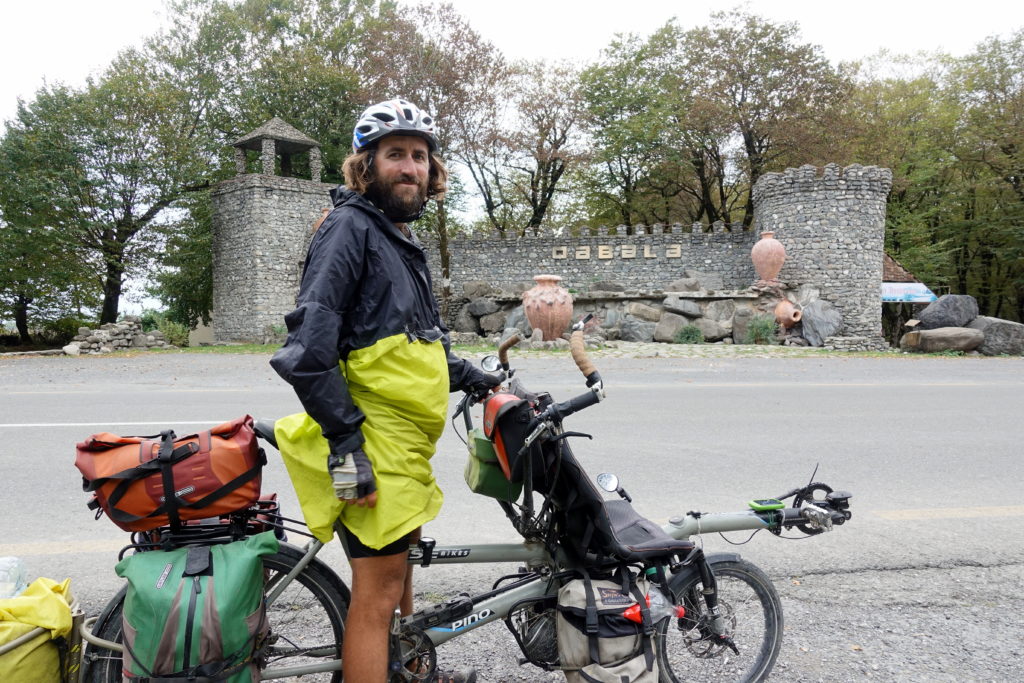
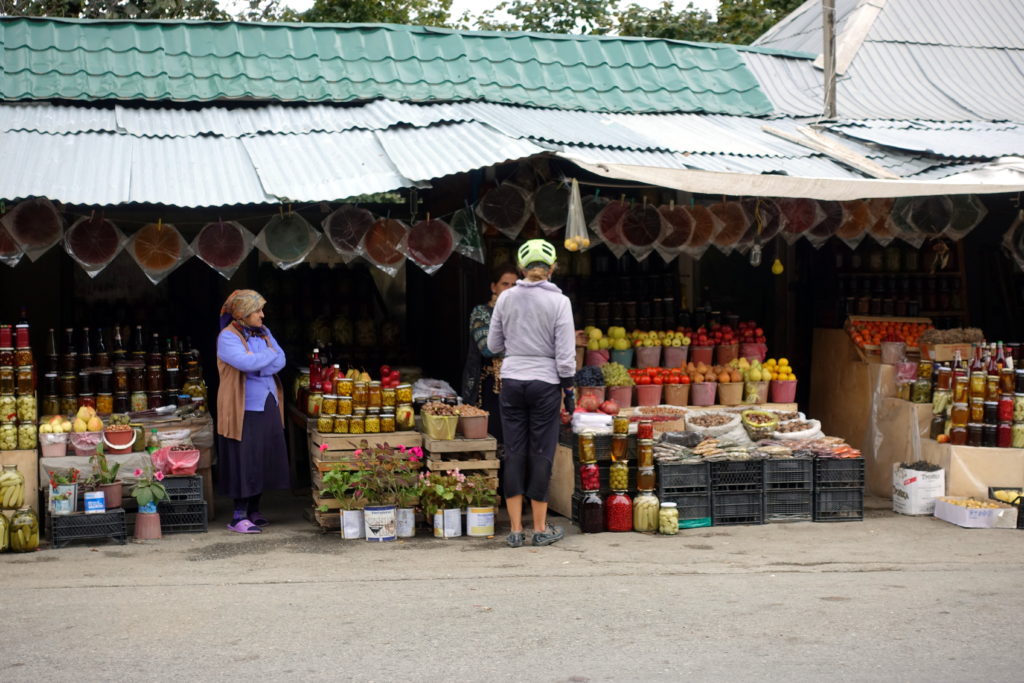
The weather was still cloudy and brisk the next morning, but the rain had ceased by the time we left. With extra layers on, we were quickly realizing what type of weather we were cycling into. From our food/tea stalls the day before, we were now seeing huge structures drying tobacco leaves on the side of the road. We took a few shortcuts which lead us through provincial villages where men we out loitering around the Saturday markets (most of them are loitering all week-long, but the market is only on Saturday!). We stopped for a picnic lunch at a small tea house in Karimli and chatted (the best we could) with some old guys about the bike. In the afternoon, we followed the road towards Sheki, with one small detour trying to follow a ‘shortcut’ that quickly became impassable due to the previous day’s rain. As we tried to get back to the road, we surprised some farmers when we emerged in their field. In the evening, we cycled up to Sheki, a historic town in the mountains. The most historic part is nestled far up the valley, so Cédric and I spent our last few kilometers huffing and cycling up the steep roads. In the evening, after regaining our strength, we ventured out in the town for dinner. Again, it appeared that only men in Azerbaijan were allowed to leave their homes – the restaurants, bakeries, and tea houses were full of guys hanging out and enjoying themselves. We really started to wonder where all the women had gone. Cédric got an explanation: they probably kidnap women whenever they can produce new males, cage them underground in a large baby-plant until they have their fifth child, and then use them for shashlik (not to be taken seriously, please no hated comments from people who don’t know us!). But yes, there are just very few women in public spaces in Azerbaijan!
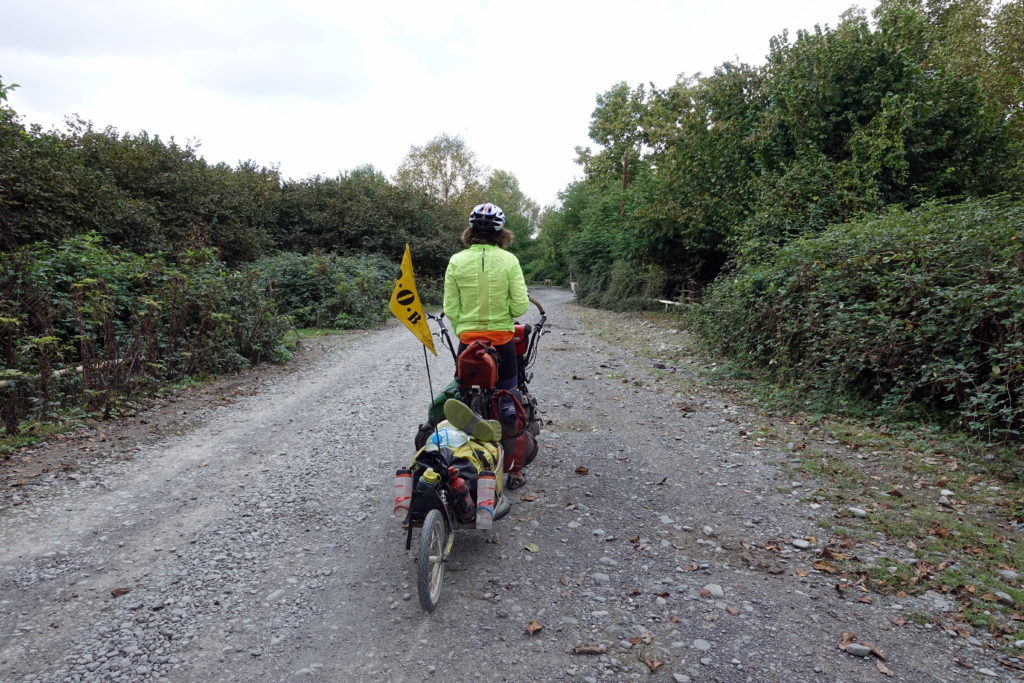
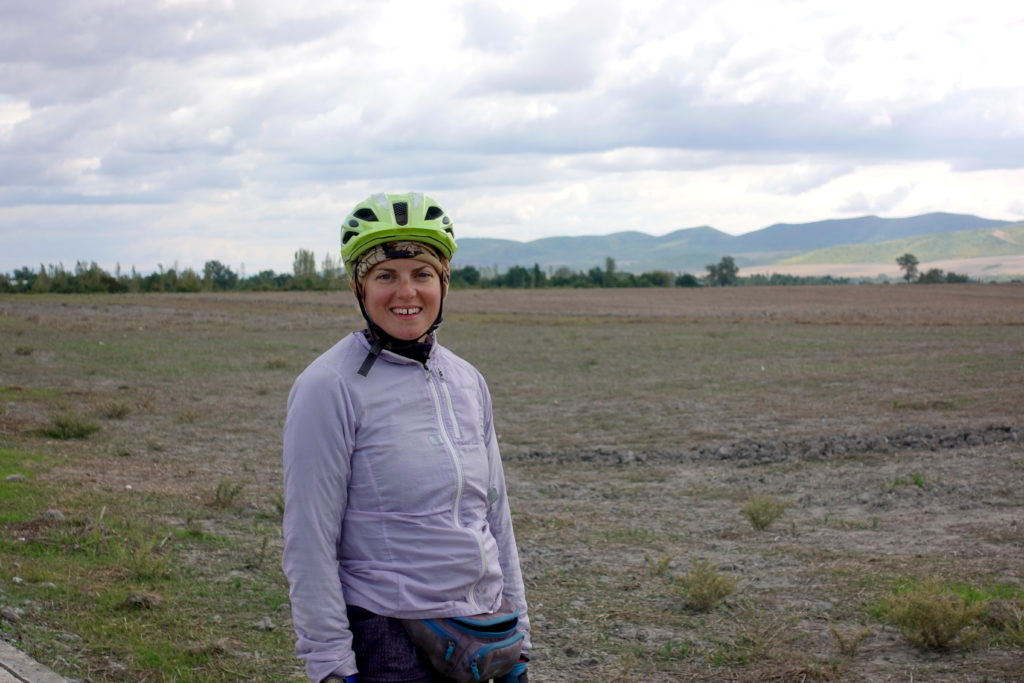
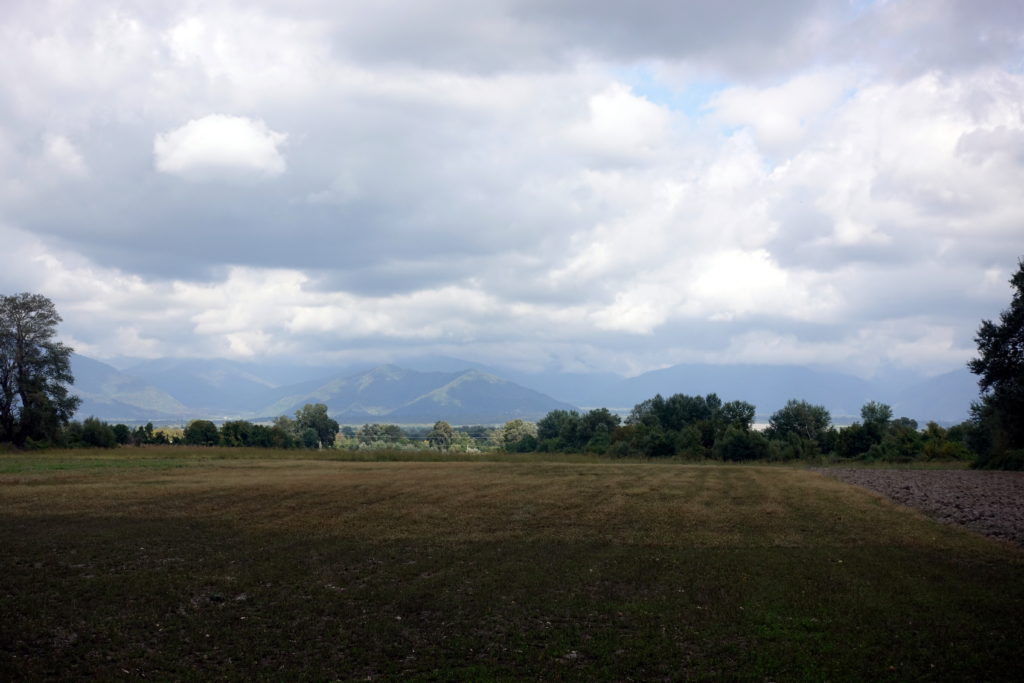
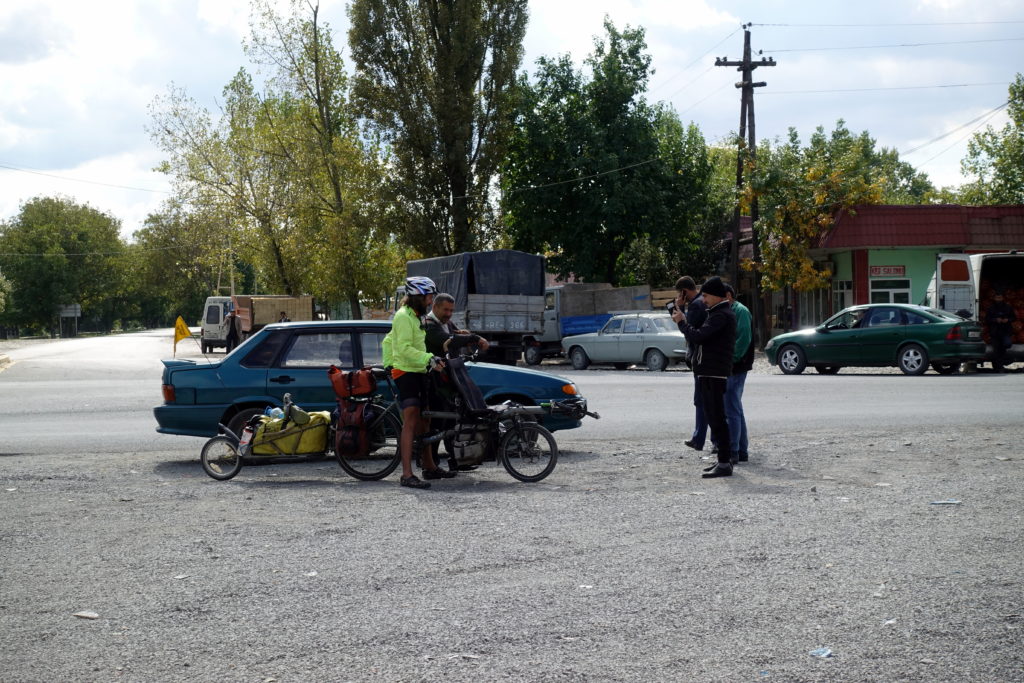
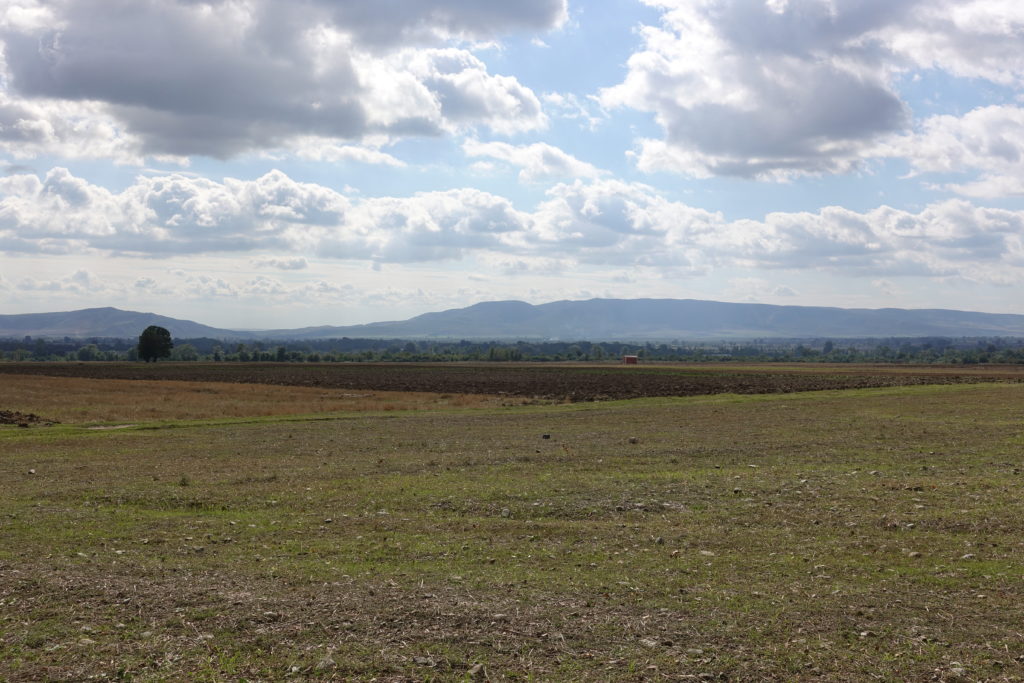
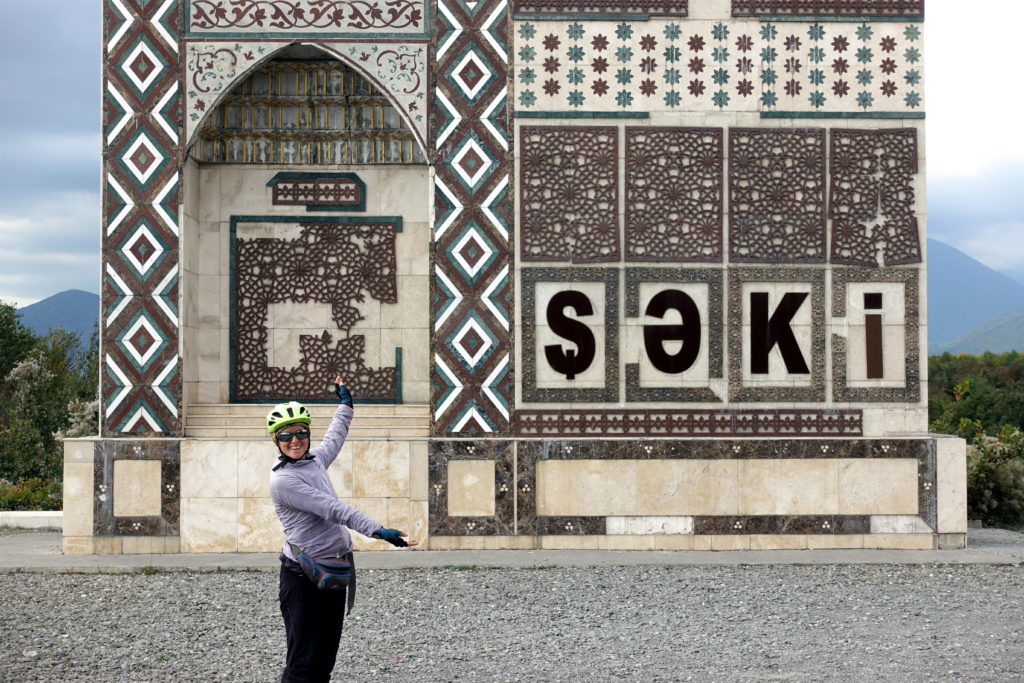
In the morning, after a hearty breakfast at our hostel, we walked up even farther up the valley to see Sheki’s sights. The farther we wandered, the more impressive the buildings became; old caravanserais (“Silk Road” market halls) took the place of simple cinder block homes, culminating with the old palace of the Sheki Kahns. Along the way, we even noticed a progressive café (most likely catering to the tourist crowd) – stating that men would only be allowed in if they were accompanied by a woman. Around noon, we left the town and continued cycling west. The closer we got to the Georgian border, the more rural the countryside became. Villages were thinning out and tucked more into the mountainside, set far away from the road. As the evening was approaching, Cédric and I became concerned that we wouldn’t find water and food before it got dark. When we finally found a market, I went inside get enough food for the next 12 hours and left Cédric to mingle with some locals. I think I got the better end of the deal, because he had to deal with two men who had a strong vodka vapors emanating from their mouths and repeatedly asked Cédric for his name (upwards of 10 times in about 10 minutes), before telling him that their names are Stepane and Igar. Cedric got to learn how to deal with drunkards… The guys also invited us to stay at their home, which was a nice offer, but we weren’t so interested in the prospect of having multiple shots shoved in our faces throughout the entire night. We left, now laden with ramen noodles, Fanta, and some bags that resembled something like cereal. When we found a good camping spot off the side of the road, we were surprised to find another traveler already there. Unlike other people who we’ve met, this guy was walking back to Germany from Beijing with a cart (maybe you’ve seen his YouTube video from a few years back? Link). For a few minutes, we exchanged stories of our trips, musings we’ve had while traveling, and agreed how awful German rap is. Unfortunately, time was running out on his Azeri visa and he needed to continue down the road, despite the setting sun. Before it got too dark, Cédric and I pitched our tent and fell asleep to the sounds of jackals crying in the distance.
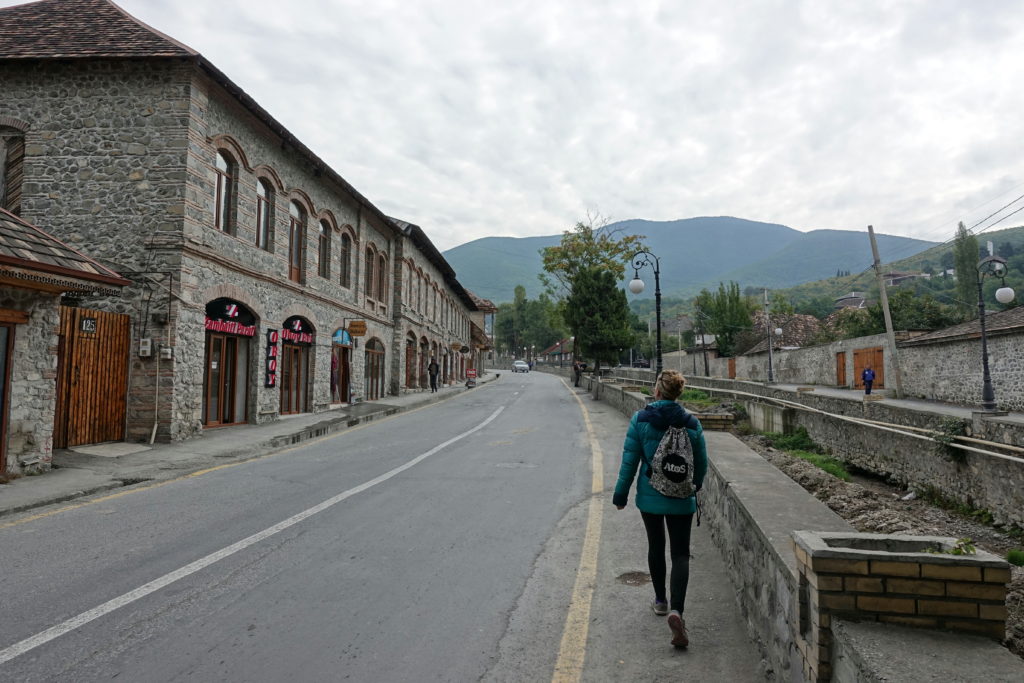
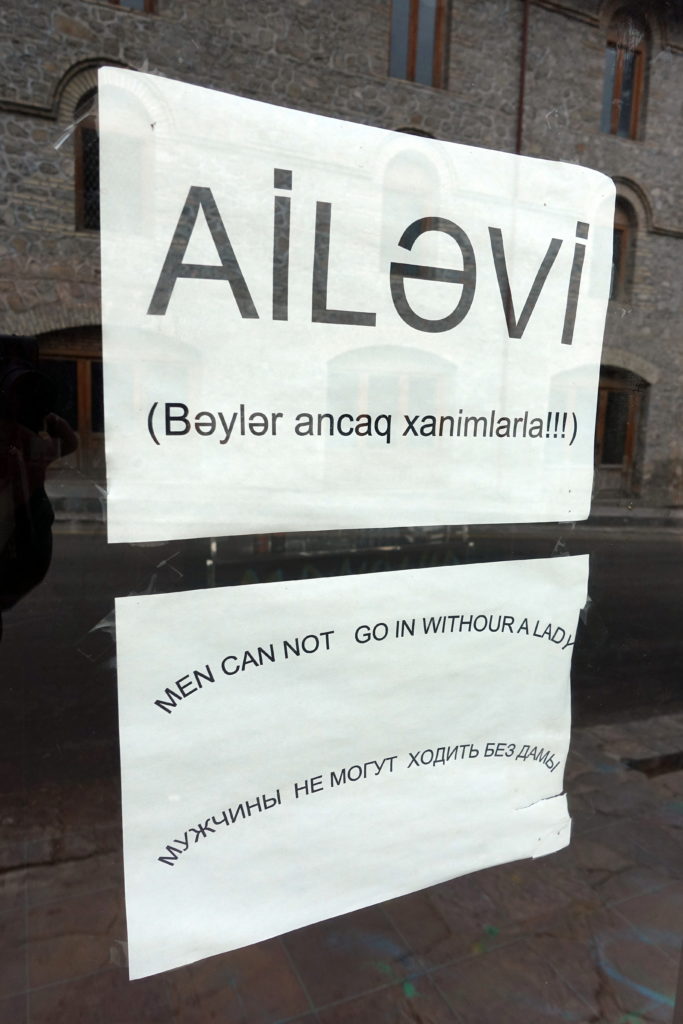
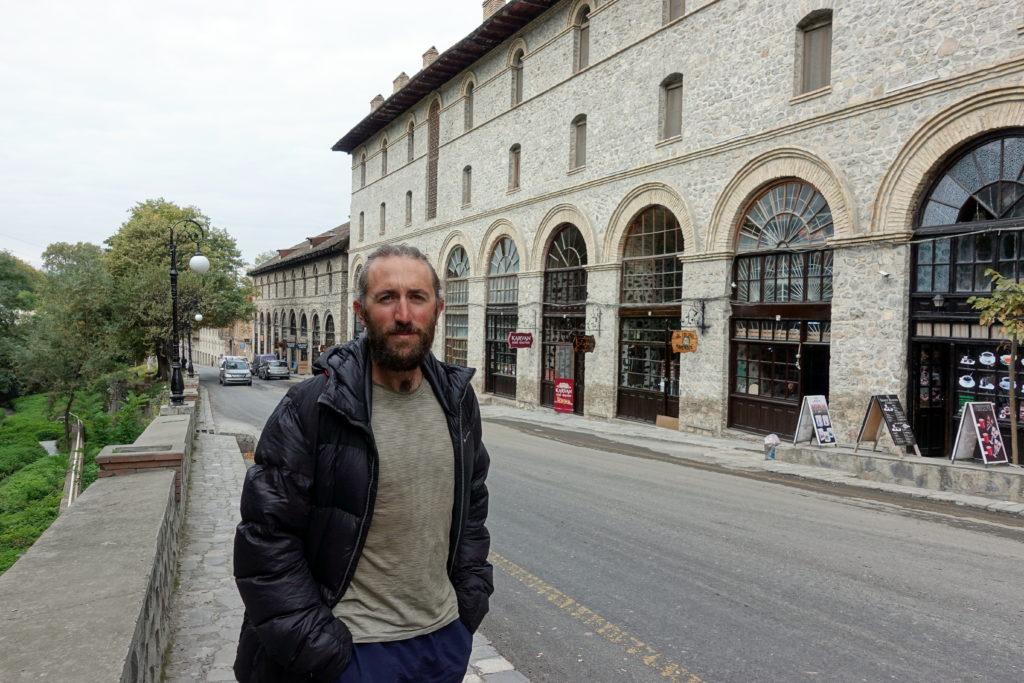
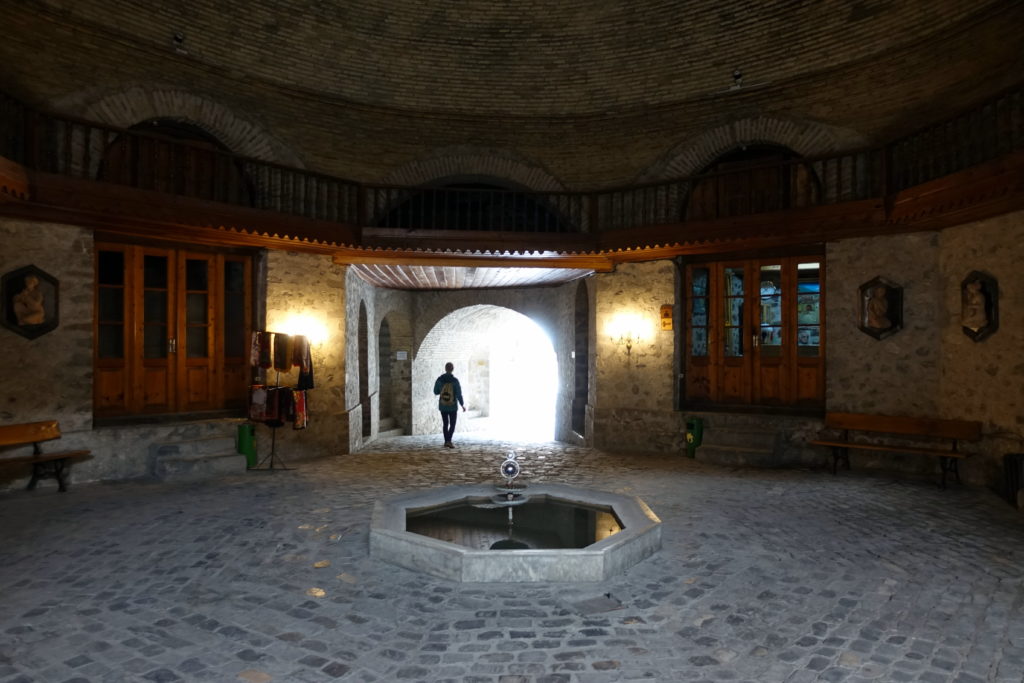
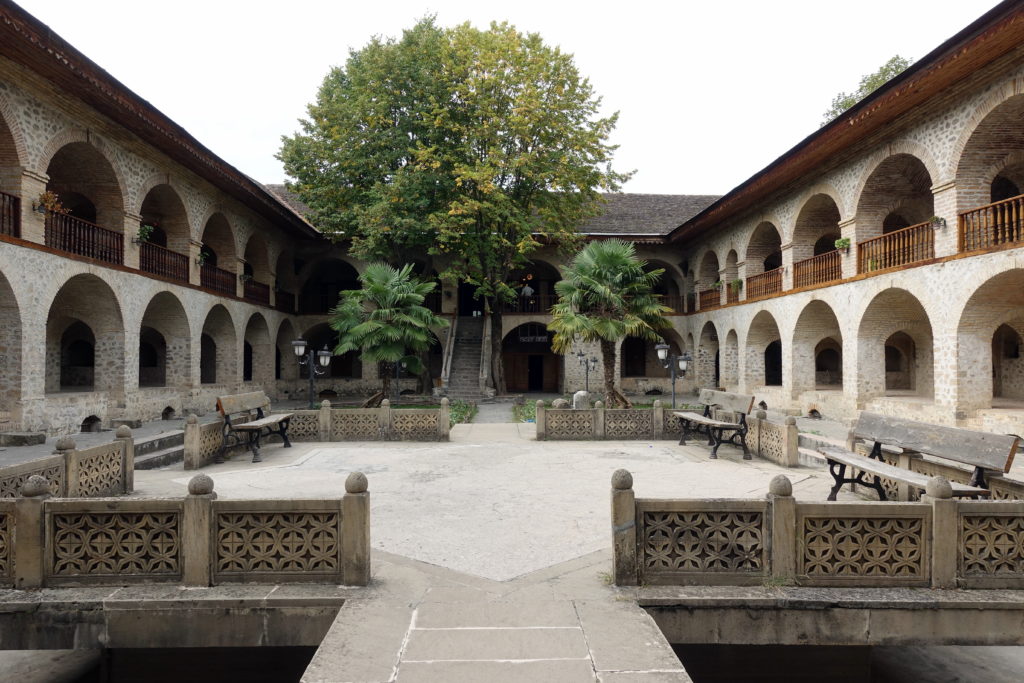
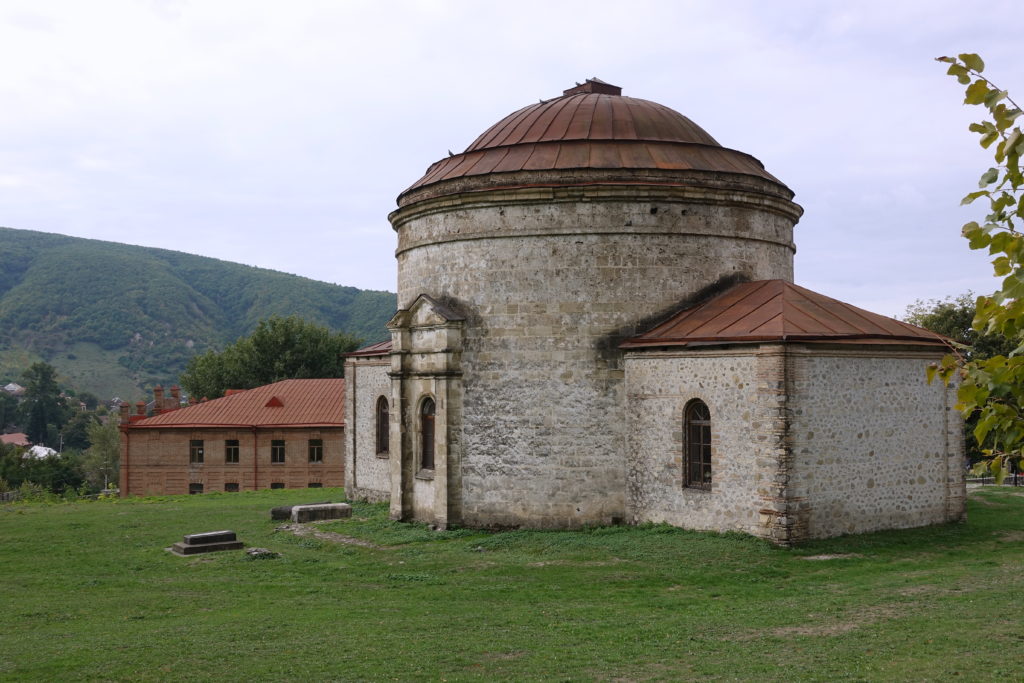
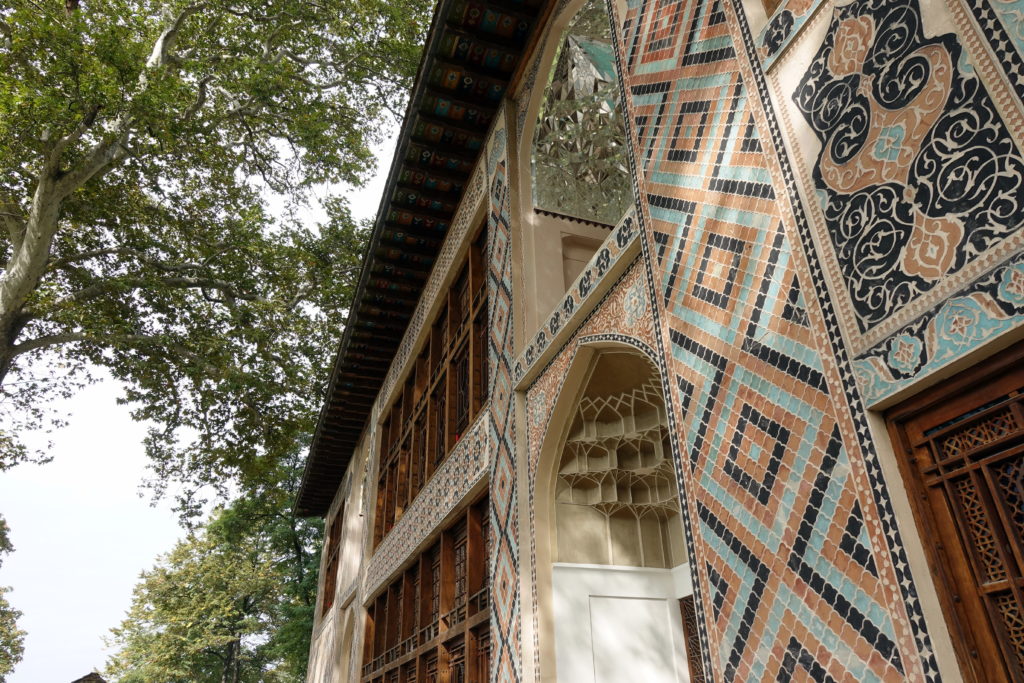
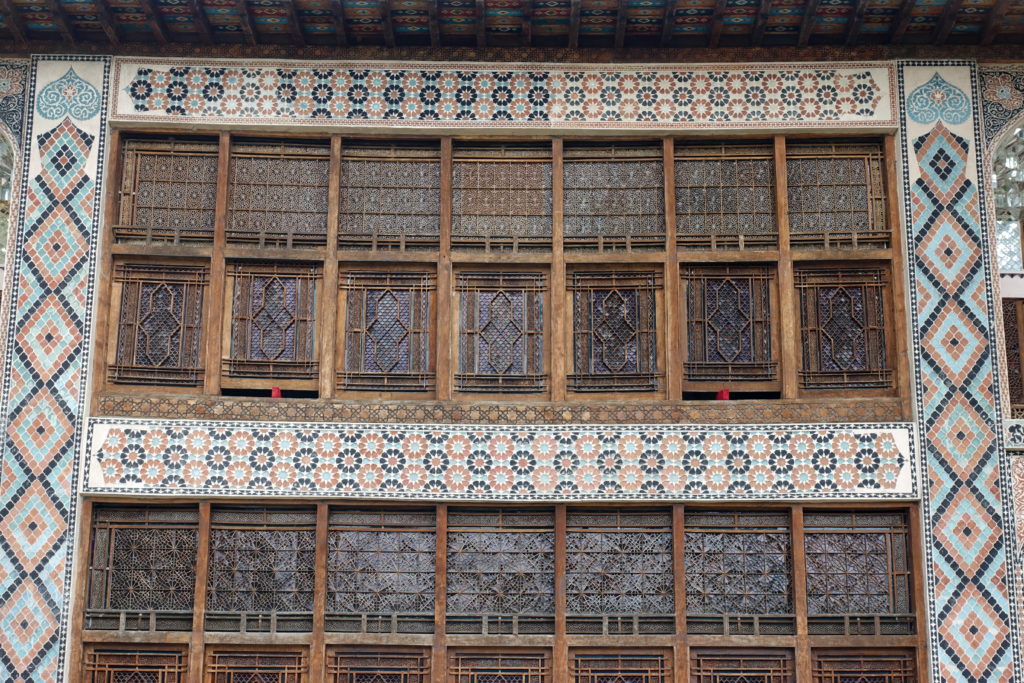
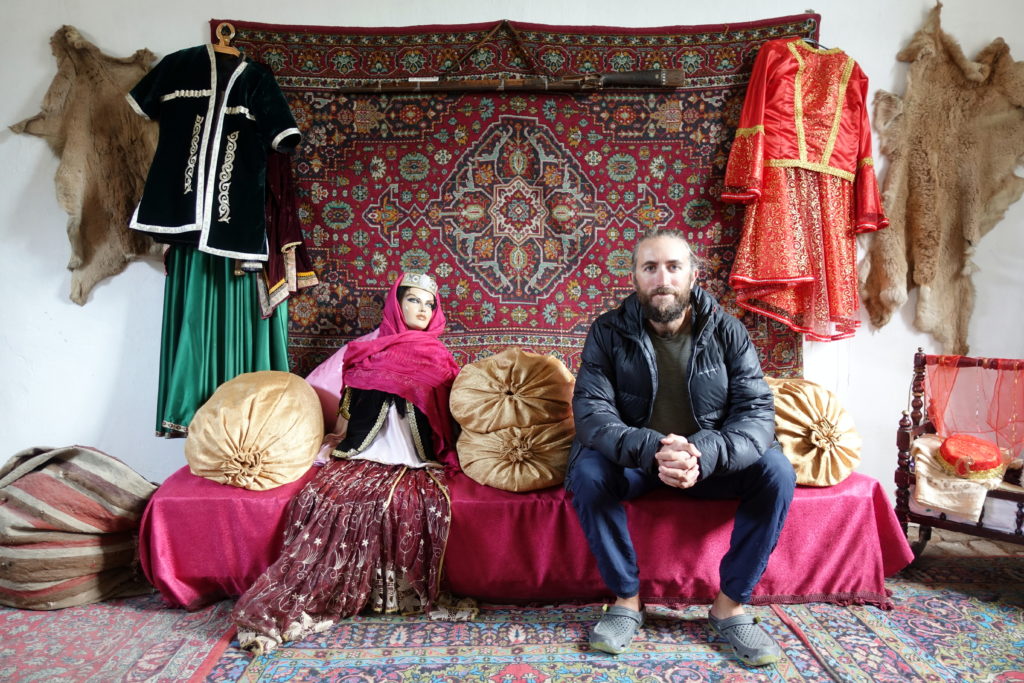
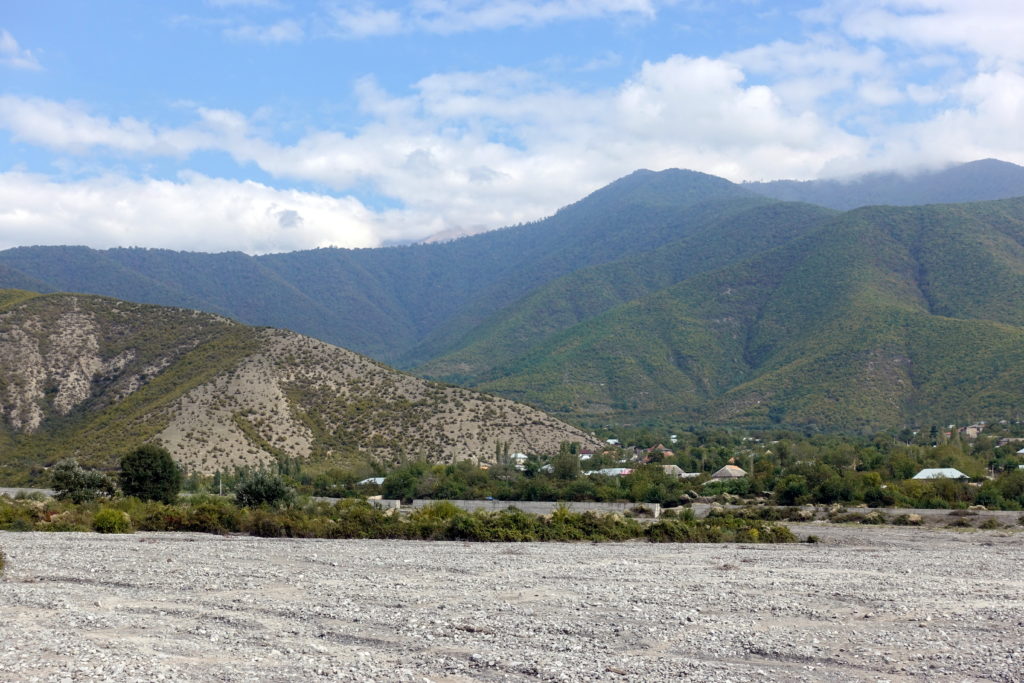
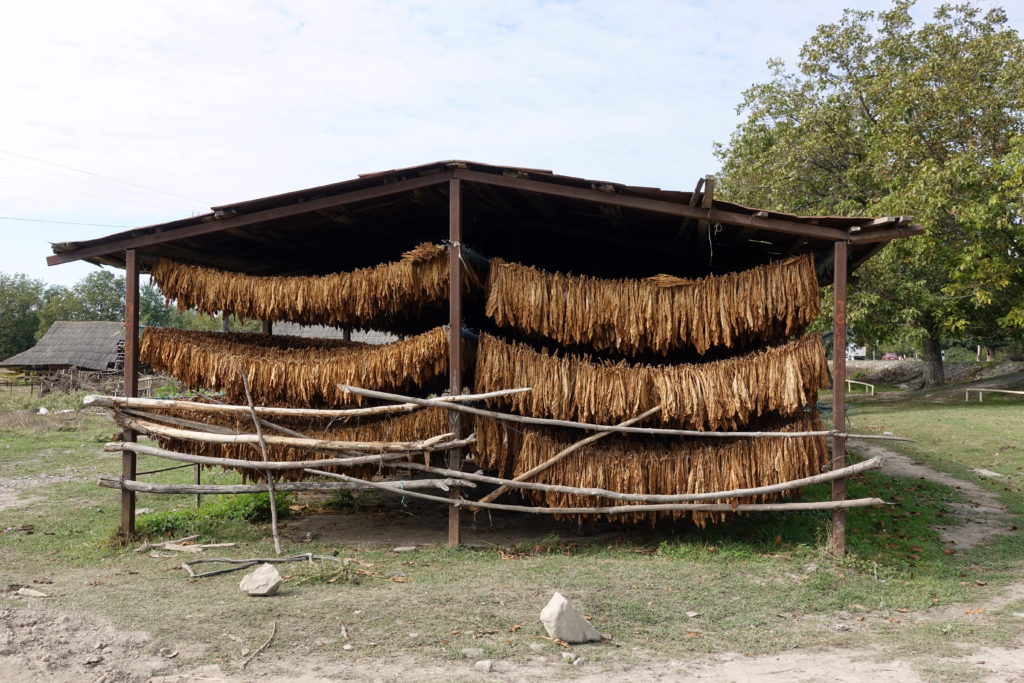
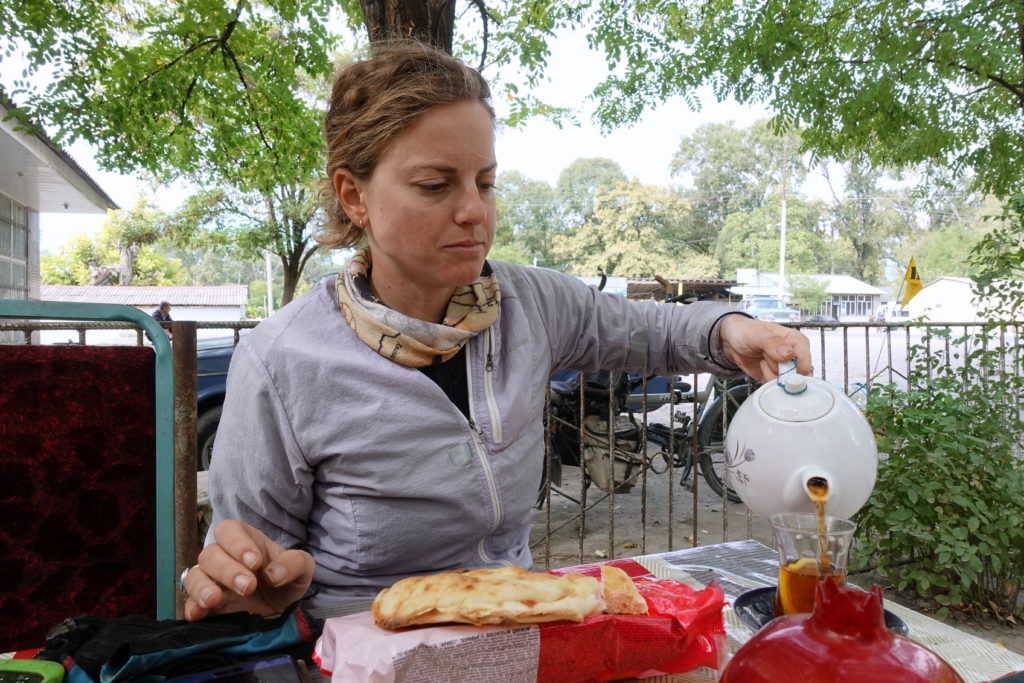
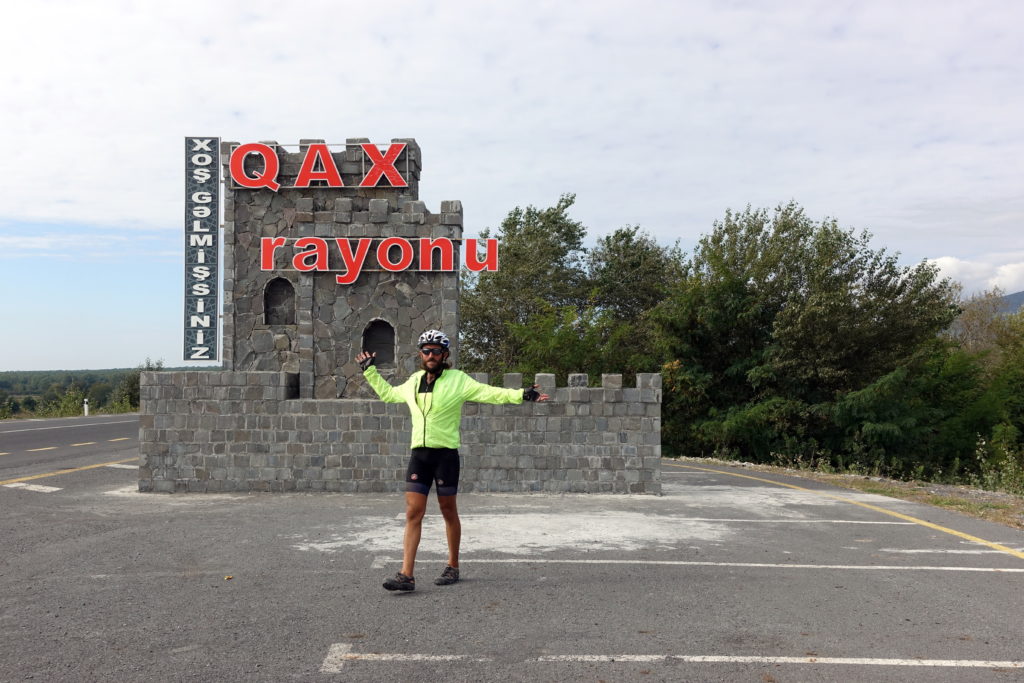
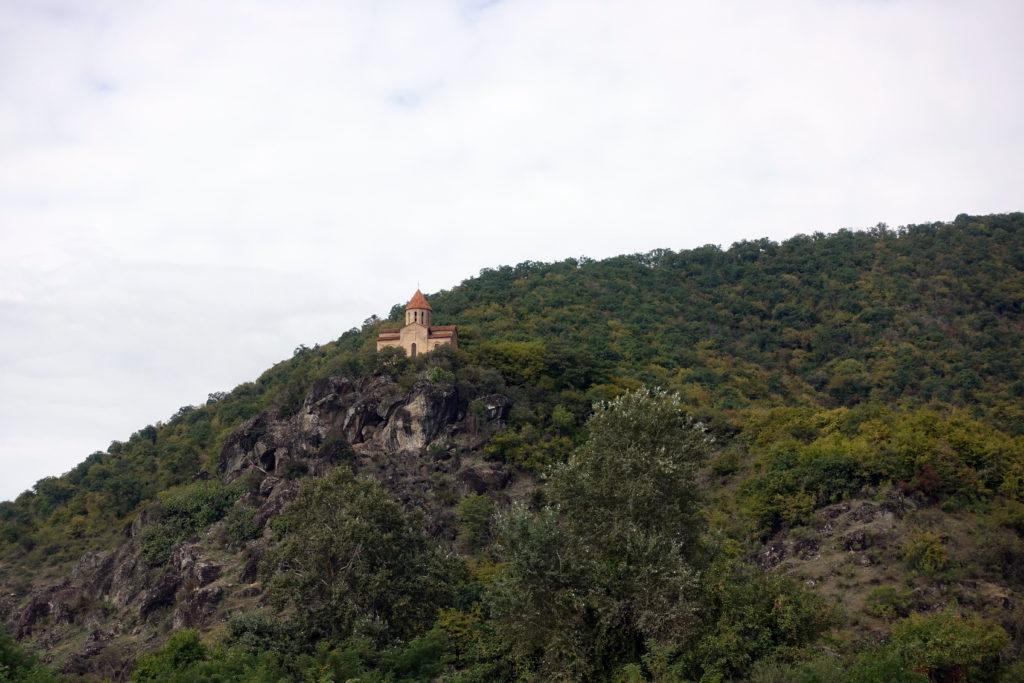
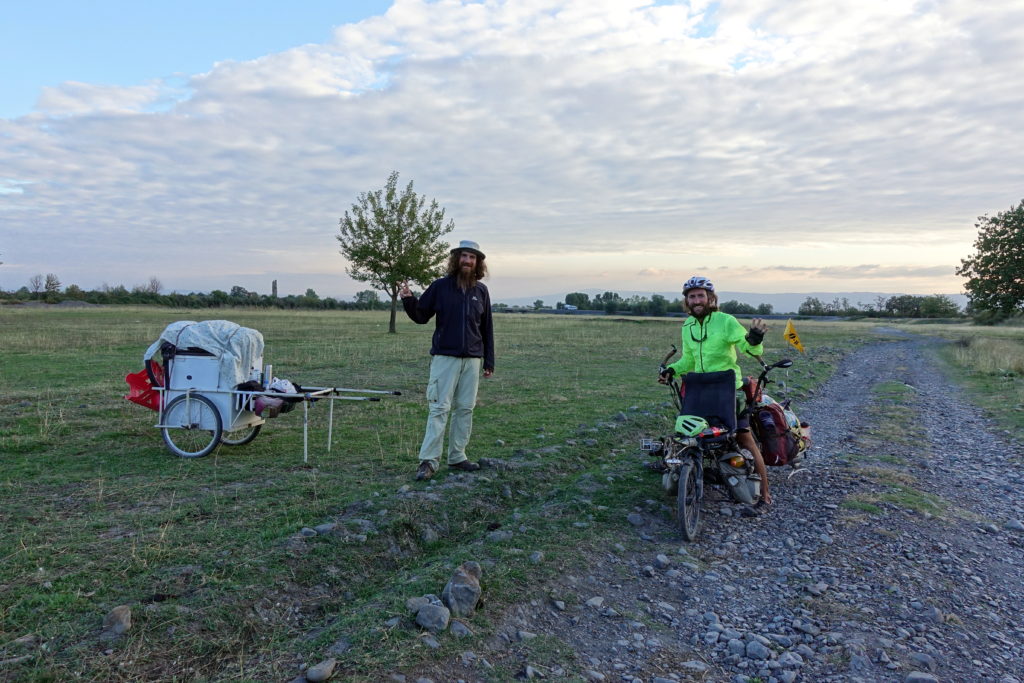
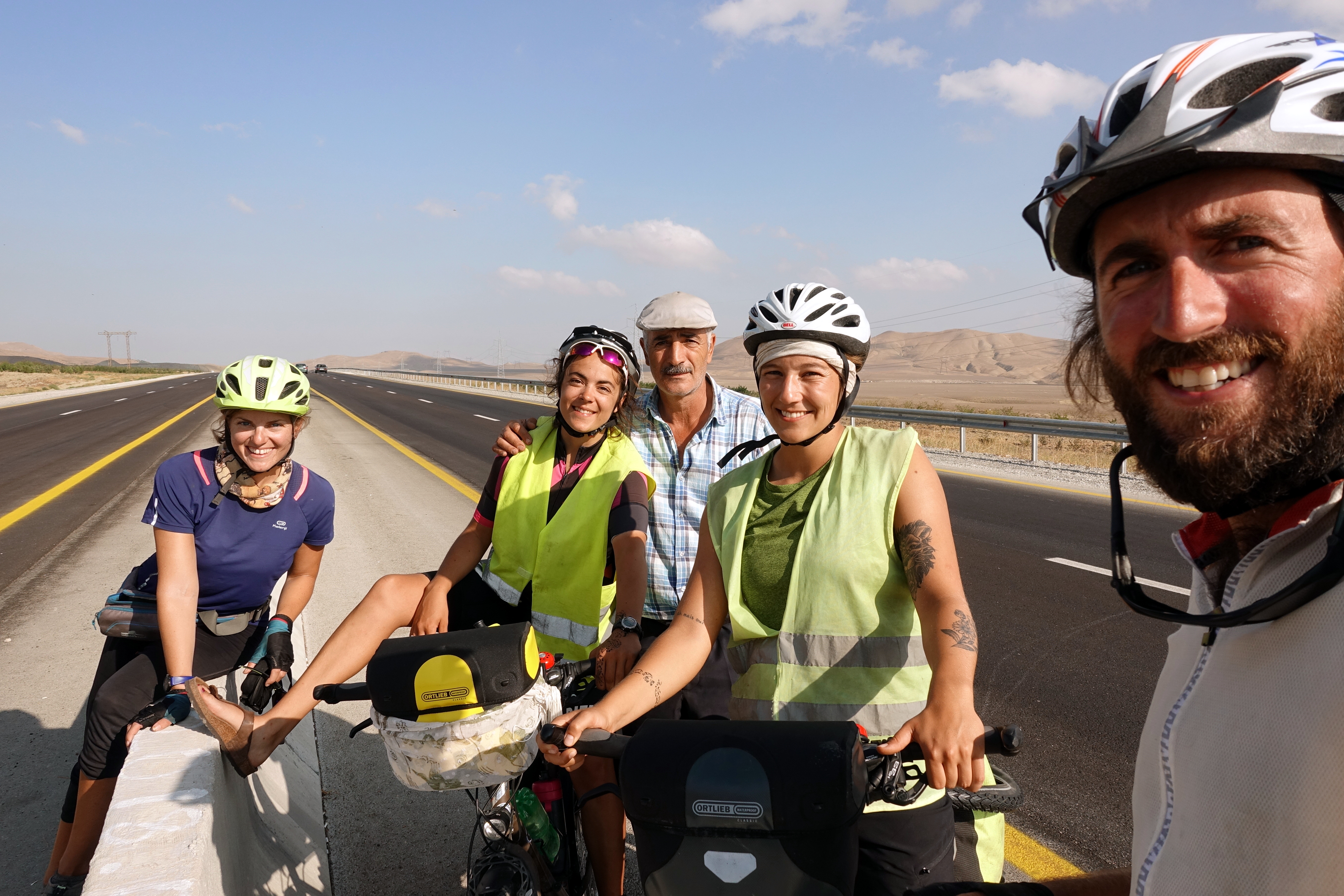
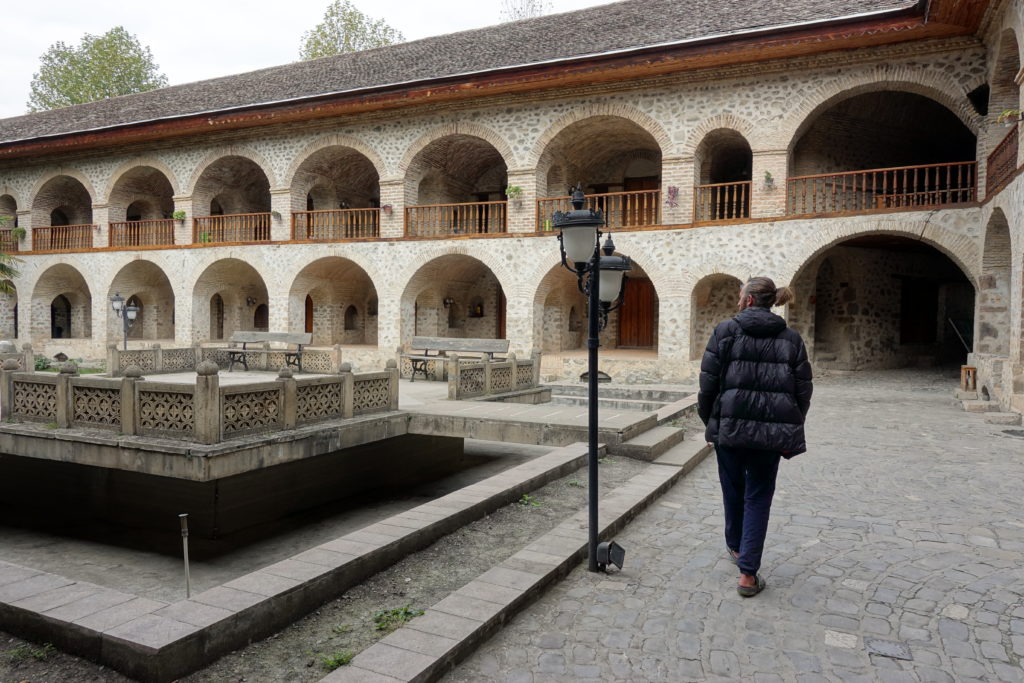
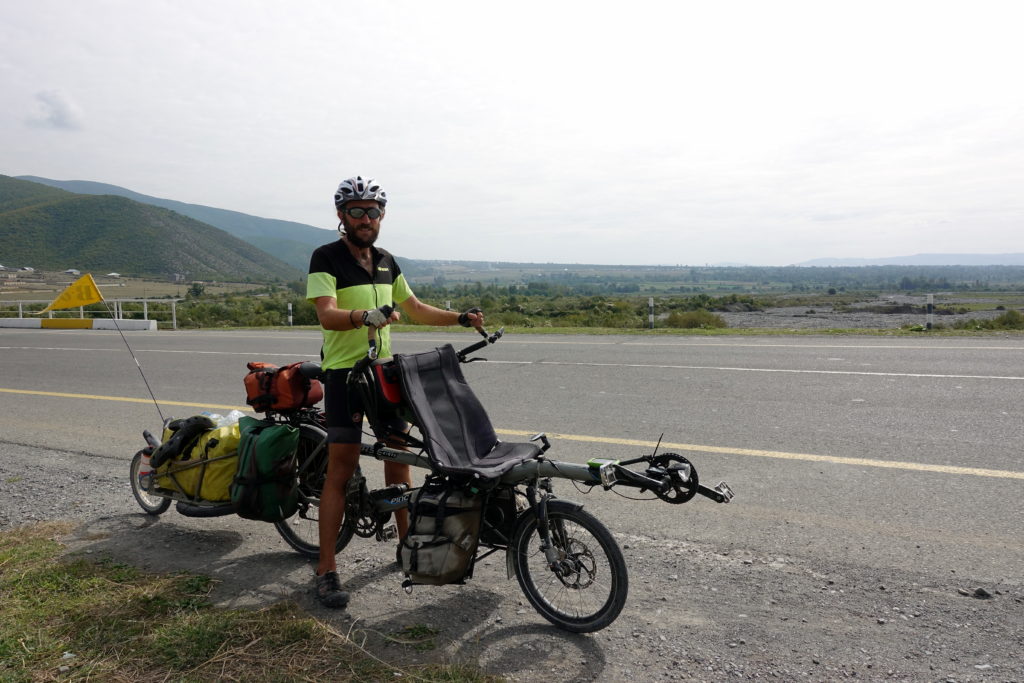
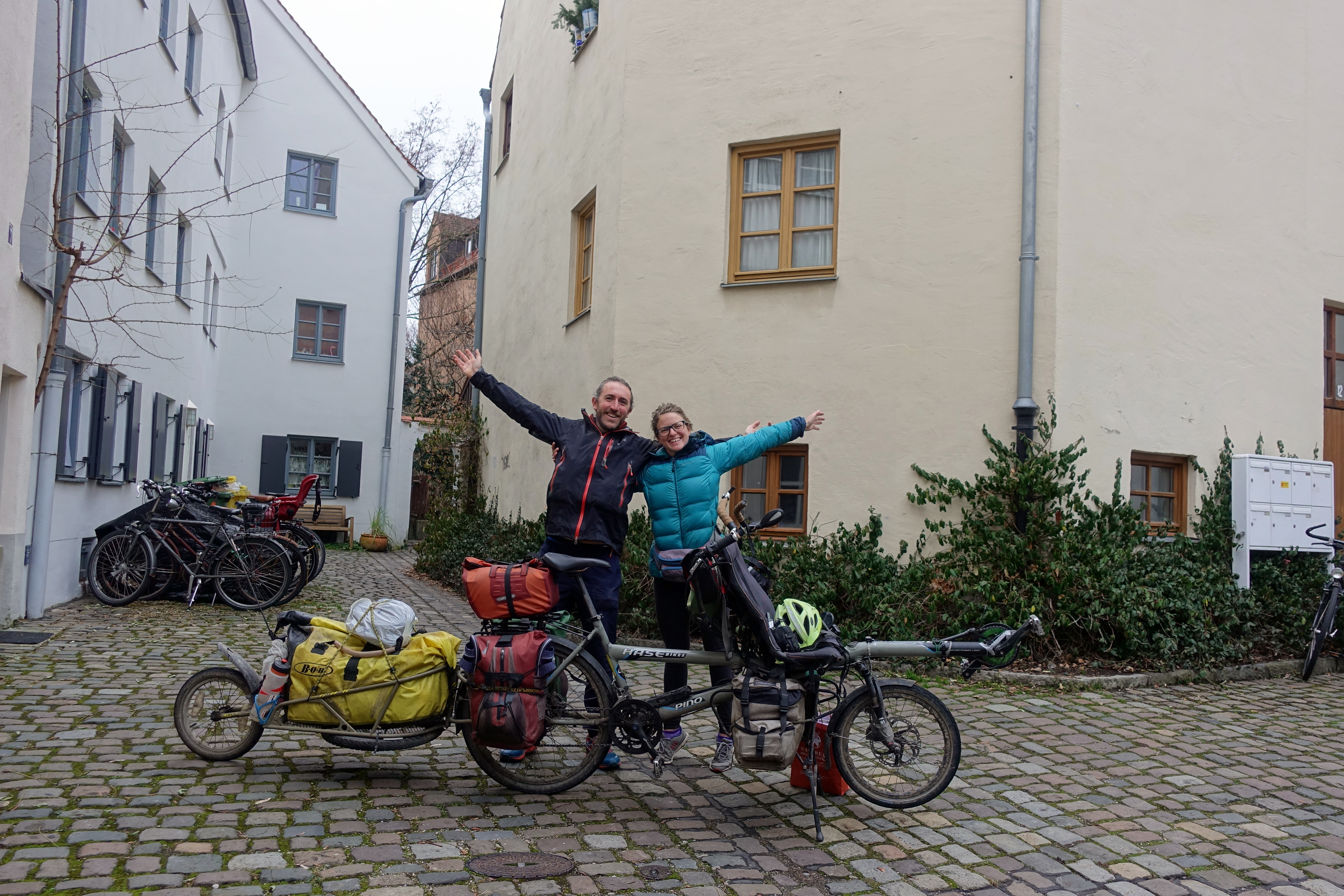
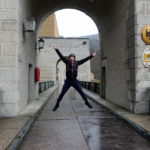
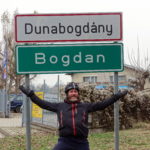
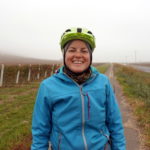
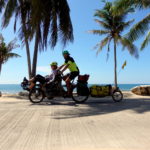
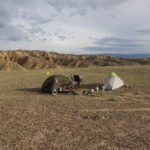
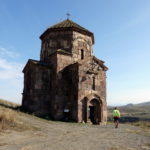
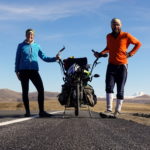
Marie-claude et Philippe
October 26, 2018 — 10:39
Amazing other German travellers… Especially the walker with the trailer. Compared, your trip looks a walkover. Another country not so friendly at least for women. Cassie we cannot vote but we support your call!
Cassie & Cédric
October 26, 2018 — 16:26
Yes, walking also makes things a lot more difficult dealing with visas. Crossing Azerbaijan on a bike in 2 weeks is no problem, but not the same on foot!
Andrew
October 26, 2018 — 17:57
Fantastic that you met Christophe. His beard-growing video is the reason you heard Indochine at my parties in the old flat 🙂
Cassie & Cédric
October 26, 2018 — 16:09
Hehe, we actually realized that it was him only a few days later! And we really met him in a hidden corner of a field, trying to be away from any roads…we first thought that we would have to discuss with a local shepherd, until he appeared to look a little too westerner – despite the very long beard!
Also, nice that you are still reading our posts 😉 We had some regular connections from Spain, but had a little forgotten that our favorite Augstralian was now Spaniard! How is it going in Pamplona?
Marssi
October 27, 2018 — 17:17
This random meeting Andrews buddy is going to need some additional explanation when you get home !! I am intrigued ..
Cassie & Cédric
October 27, 2018 — 17:52
I am not sure Andrew really knows Christoph. He may just ”know him from YouTube”… That’s what we understood 🙂
Otherwise we’d also be intrigued!
Andrew
October 31, 2018 — 16:50
Just to clarify- I’ve never met Christophe. I’ve just seen his somewhat famous video of travelling across China and growing a beard. As have many others.
It’s going OK in Pamplona, apart from the cold and the wet, plus the snow in the nearby hills. Training for a marathon in Valencia on 2nd December, and a few days after that we’ll be back in Augsburg for a few days. So if you’re back by then…
Colby & Carol
October 28, 2018 — 22:59
Re: I like the pic of ‘Fruit Leather circles’ in Azerbaijan! Living in the ‘fruit belt’ area of Michigan, and visiting our local outdoor market regularly, I’ve not yet seen anyone selling fruit leather. Hanging it / displaying it in ‘circles’ is very appealing, much better than looking at simple fruit roll-ups – – displaying it like that is a great way to market it, however it might also be an attraction for flies (at least here where we do have some flies). Reading up on it, appears fairly simple to make too. Hmmmm . . . $$$???
Take care, glad you are away from all those touchy, feely men now.
Love, Colby & Carol